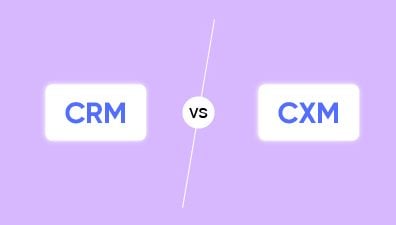Choosing the best CRM for your Shopify store is crucial to streamline your operations, automate workflows, and gain valuable insights into customer behavior. A robust CRM can help you manage customer interactions, track sales, and marketing efforts, and provide personalized experiences that drive customer loyalty. But with so many CRM options available, finding the perfect fit for your Shopify store can be challenging.
In this comprehensive guide, we explore the best CRM for Shopify stores, highlighting their features, benefits, and how they can transform your business operations. From seamless integrations to advanced analytics, these CRM solutions are designed to enhance your Shopify experience and ensure your store’s success. Whether you’re a small business owner or a large enterprise, this blog post will help you make an informed decision about the best CRM for your Shopify store.
Table of Contents
Top 15 Best CRMs for Shopify Stores
A powerful CRM can make all the difference by providing deep insights into customer behavior, automating marketing efforts, and enhancing overall customer satisfaction. For Shopify store owners, finding a CRM that seamlessly integrates with their platform is essential for maximizing efficiency and driving growth.
In this section, we explore the top 15 best CRMs for Shopify stores, each offering unique features and benefits to help you elevate your business and build stronger, more profitable customer relationships. Whether you are a small business owner or managing a large enterprise, these CRMs are designed to meet the diverse needs of Shopify merchants, ensuring you have the tools necessary for success.
Zendesk Sell
Zendesk Sell is widely recognized as one of the best CRM solutions for Shopify stores due to its robust features, seamless integration capabilities, and user-friendly interface. Designed to enhance sales productivity, improve pipeline visibility, and foster stronger customer relationships, Zendesk Sell provides a comprehensive suite of tools tailored to meet the unique needs of eCommerce businesses. For Shopify store owners looking to streamline their sales processes, gain valuable insights, and deliver exceptional customer experiences, Zendesk Sell stands out as an ideal choice.
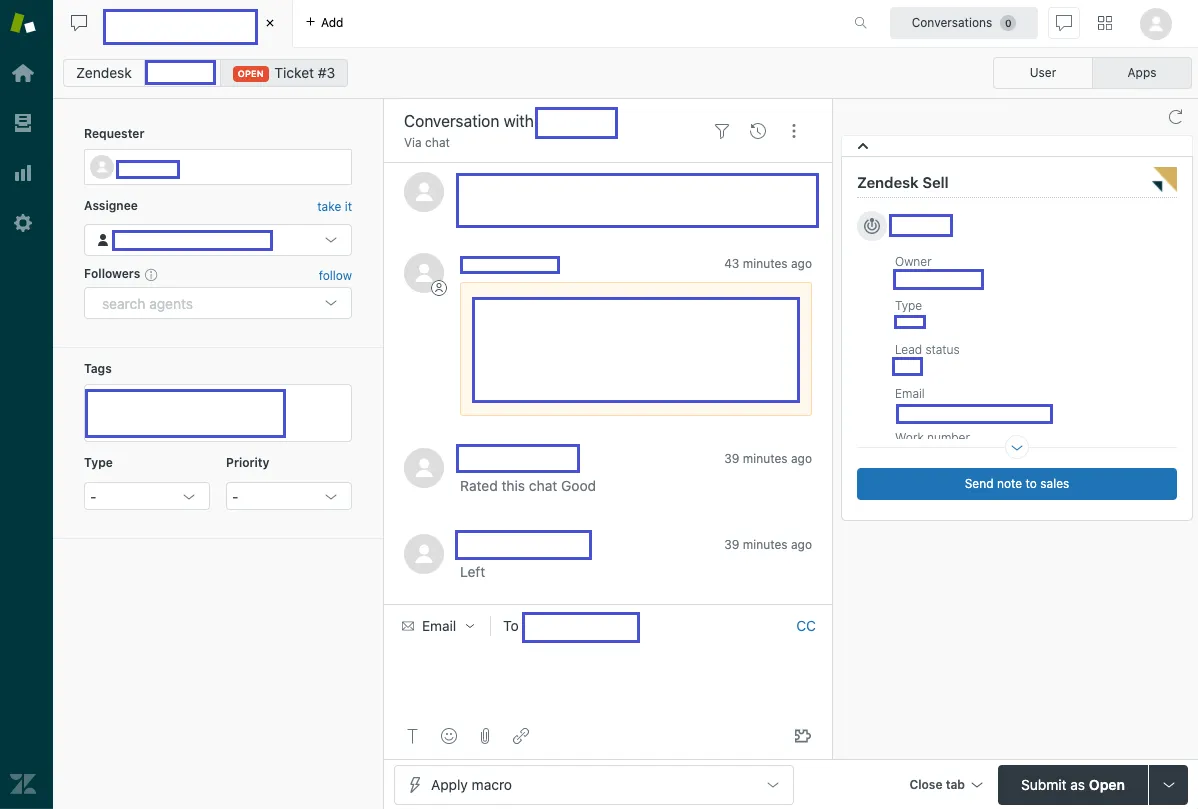
What sets Zendesk Sell apart from other CRM solutions is its ability to integrate smoothly with Shopify, enabling store owners to manage their customer data, sales pipelines, and marketing efforts all in one place. This integration ensures that all customer interactions and sales activities are tracked and recorded, providing a complete view of the customer journey from initial contact to final purchase. Additionally, Zendesk Sell’s intuitive interface makes it easy for users to navigate and utilize its powerful features, ensuring that Shopify store owners can quickly implement and benefit from this CRM solution.
Key features
- Reporting and Statistics: Zendesk Sell provides a variety of reports on funnel movement, employee activity, performance management, sales performance, and marketing effectiveness. These reports can be customized based on parameters such as date ranges, sales representatives, and sources, offering detailed insights to optimize sales strategies.
- Dashboard: The visual dashboard in Zendesk Sell showcases all key metrics with accessible drag-and-drop features. Users can customize their dashboard to prioritize to-do lists, sales pipeline, performance charts, and more, tailoring it to their specific requirements for an efficient workflow.
- User Management: Admins and managers can create and share an organizational chart and grant role-based access to users. This feature ensures that the right team members have the appropriate access to information and tools needed for their roles.
- Email Marketing: Users can sync their existing email accounts with Zendesk Sell to send targeted and personalized emails to clients. The platform offers pre-built templates to cater to contacts across the buyer journey and retention cycle. Email tracking features, including open-rate, click-rate, and response-rate, combined with detailed reports for mass mailing campaigns, provide full email marketing support.
- Sales Pipeline Management: Zendesk Sell offers a visual sales pipeline that helps users track and manage their sales opportunities from start to finish. The drag-and-drop interface allows for easy customization and real-time updates, ensuring that the sales process is smooth and transparent.
- Contact and Lead Management: Store owners can store and manage all customer information in one centralized database. This includes contact details, purchase history, and communication logs, which can be easily accessed and updated, providing a complete view of each customer.
Pros and Cons
Pros
- Easy to Use: Zendesk Sell boasts an intuitive interface and straightforward navigation, making it simple for users to learn and use effectively without extensive training.
- Offline Access: Zendesk Sell offers limited offline access, allowing users to view all details, update progress against their task lists, and attach notes and documents. Changes are synced to the platform once the network is connected again, ensuring continuous productivity.
- Integrations: Zendesk Sell integrates seamlessly with various third-party applications, such as email marketing tools and customer support platforms, providing a unified system that enhances overall operational efficiency.
- Reporting and Analytics: Robust reporting and analytics tools provide valuable insights into sales performance. These tools help businesses track progress, identify trends, and make data-driven decisions that drive growth and optimize strategies.
Cons
- Limited Customization: Despite its strengths, Zendesk Sell can fall short when it comes to tailoring the platform to specific workflows, particularly in building custom objects and modifying existing fields. This rigidity can hinder efficiency for businesses with unique processes.
- Reporting Challenges: Generating customized reports and extracting meaningful insights from data can be cumbersome. The reporting tools, while robust, may lack the flexibility and depth needed for comprehensive analysis.
- Mobile App Limitations: The mobile app’s functionality does not match the capabilities of the web version, with limited features and occasional performance issues. This can be a drawback for users who need full access to CRM functionalities on the go.
Additional information and Overall evaluation
Deployment | Cloud-based |
Platforms | Linux - MacOS - Windows - ChromeOS - Android |
Mobile app | Android, iOS |
Price | Starting at $25/user/month |
Free Trial | Yes |
Shopify Integration | Yes |
Suitable for | All-sized eCommerce Business |
All in all, Zendesk Sell is an excellent choice for Shopify store owners looking for a powerful and user-friendly CRM solution. Its seamless integration with Shopify, robust features, and intuitive interface make it one of the best CRMs for managing customer relationships and sales processes. Suitable for businesses of all sizes, Zendesk Sell caters to both B2B and B2C eCommerce operations, making it a versatile option for diverse business needs.
While there are some considerations regarding limited customization; the benefits of integration and streamlined operations far outweigh these potential drawbacks. For Shopify store owners aiming to take their business to the next level, Zendesk Sell provides the tools and capabilities needed to build stronger customer relationships, drive sales growth, and achieve long-term success in the competitive world of eCommerce. By choosing Zendesk Sell as their CRM, Shopify store owners can ensure they are well-equipped to meet the demands of their customers and stay ahead of the competition.
HubSpot CRM
HubSpot CRM stands out as one of the best CRM solutions for Shopify stores due to its comprehensive features, user-friendly interface, and seamless integration capabilities. Designed to enhance customer relationship management for businesses of all sizes, HubSpot CRM offers a robust suite of tools that cater to both B2B and B2C eCommerce operations. Its ability to integrate smoothly with Shopify ensures that store owners can manage their customer data, sales pipelines, and marketing efforts all in one place. This integration provides a holistic view of customer interactions, enabling businesses to deliver personalized experiences and drive growth.
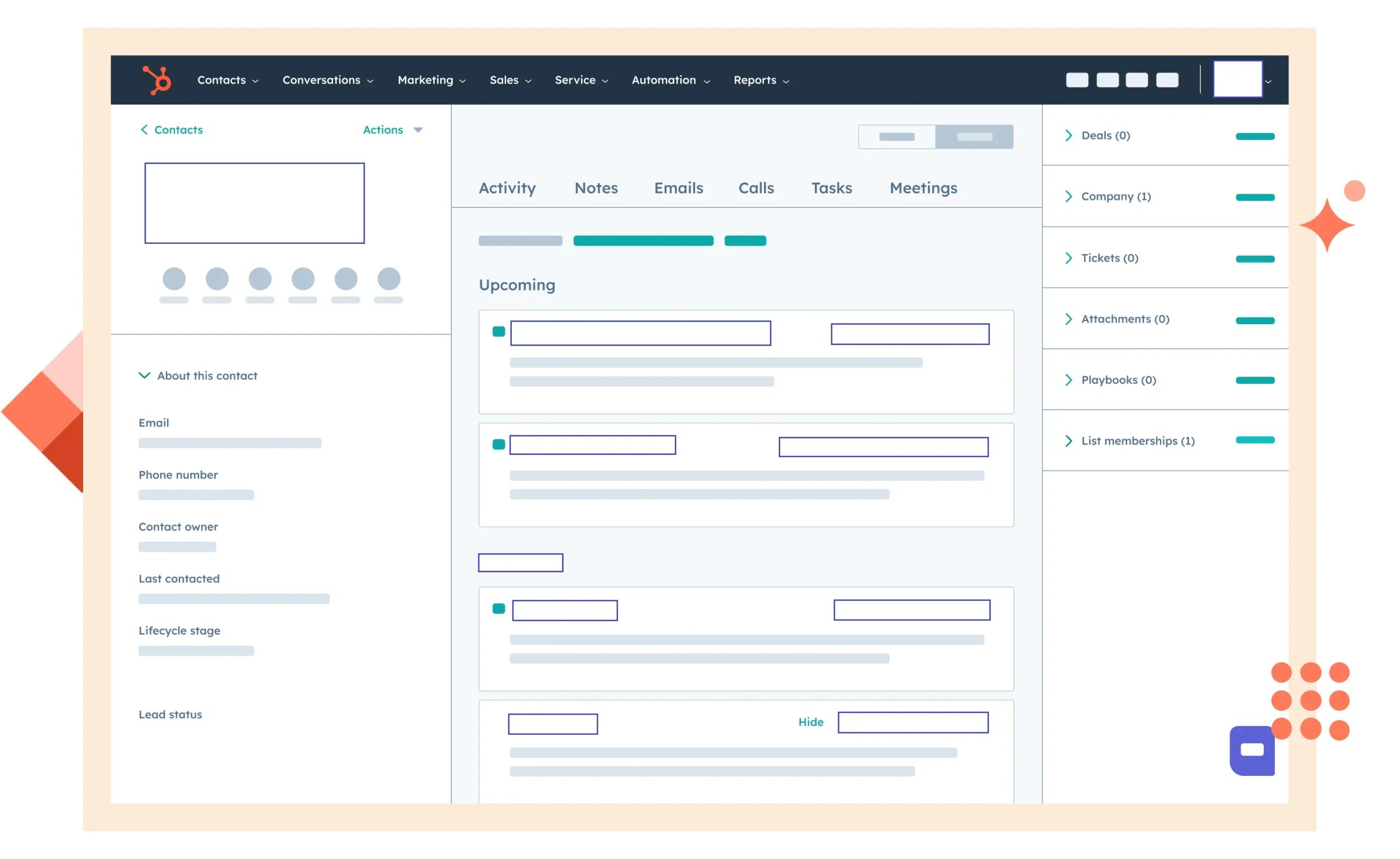
What makes HubSpot CRM particularly appealing for Shopify store owners is its extensive functionality combined with a free entry-level offering. This allows small businesses to access powerful CRM features without a significant financial commitment. HubSpot CRM’s scalability also ensures that as businesses grow, they can easily upgrade to more advanced features and capabilities, making it a versatile solution for long-term success.
Key features
- Email Tracking: HubSpot CRM provides instant notifications when a prospect opens an email, clicks a link, or downloads an important document such as a proposal. Users can personalize outreach for engaged leads and automate follow-ups for those who don’t engage, increasing email opens, booked meetings, answered calls, and sales. This feature also allows users to see a lead’s history at a glance and track interactions with documents, emails, and links.
- Contact Insights: This feature eliminates guesswork by tracking recent email interactions and providing access to detailed contact records. Users can send personalized, context-based messages based on comprehensive contact information, enhancing the relevance and effectiveness of their communications.
- Prospect Management: HubSpot CRM helps users focus on interested prospects by utilizing visitor and page view data. Custom views for sales reps and filters allow users to slice and dice data based on criteria such as the number of visits, geography, and company size. Daily email digests and revisit notifications ensure timely follow-up, keeping sales teams on top of their leads.
- Call Tracking: This feature enables users to prioritize calls and set up queues using engagement and contact property data. Users can place and record calls directly from the desktop browser, with each call automatically logged in HubSpot CRM. This automation frees up time for sales teams to focus on core business functions.
- Customizable Pipelines: HubSpot CRM allows users to create new leads quickly and customize them to match their sales process. Sales dashboards provide insights into progress toward monthly activities, sales quotas, and the overall health of pipelines. This feature lets users see potential revenue scope and focus on the right deals to maximize sales opportunities.
Pros and Cons
Pros
- Easy to Use: HubSpot CRM’s interface is intuitive and easy to navigate, even for those with limited technical experience. This ease of use leads to faster adoption and higher productivity within sales teams.
- Comprehensive Features: HubSpot CRM offers a wide range of features that cover the entire sales process, from lead generation and prospecting to deal closing and customer relationship management. This comprehensive suite of tools eliminates the need for multiple, disparate sales software solutions.
- Integrations: HubSpot CRM integrates seamlessly with various business applications, such as email marketing platforms, customer support tools, and social media management software. These integrations streamline data sharing and improve overall efficiency.
- Scalability: HubSpot CRM is designed to grow with businesses of all sizes. Whether you’re a small startup or a large enterprise, the platform can accommodate your evolving sales needs.
Cons:
- Cost: The platform’s cost can increase significantly as you add more contacts or require advanced features, potentially making it less suitable for smaller businesses or those with budget constraints.
- Learning Curve: The extensive features and functionalities can lead to a steep learning curve for new users, requiring time and effort to fully grasp the platform’s capabilities.
- Data Management Challenges: Managing data and notes can be challenging due to the possibility of duplicate entries. Merging duplicate records can be time-consuming and may hinder efficiency.
If cost is the only factor preventing your business from this robust CRM suite, talk to our HubSpot team so that we can help you customize the best package with the most suitable price and performance for your team.
Additional information and Overall evaluation
Deployment | Cloud-based |
Platforms | MacOS - Windows - Android |
Mobile app | Android, iOS |
Price | Free Starter: $15/user/month (1,000 contacts) Professional: $800/month (2,000 contacts + $45/user/month) Enterprise: $3,600/month (10,000 contacts + $75/user/month) |
Free Trial | Yes |
Shopify Integration | Yes |
Suitable for | All-sized eCommerce Business |
HubSpot CRM has garnered positive feedback as one of the best CRMs for Shopify stores, thanks to its user-friendly interface and comprehensive features. This makes it a popular choice among businesses of all sizes. Users appreciate the platform’s ease of use, highlighting its intuitive design and straightforward navigation as key strengths. Additionally, HubSpot CRM’s affordability makes it an attractive option for businesses with budget constraints, providing excellent value without compromising on functionality.
However, some users have noted limitations in HubSpot CRM’s integration capabilities and reporting functionalities. Despite these drawbacks, HubSpot CRM remains a strong contender in the sales software market, offering a well-rounded solution for Shopify store owners seeking an affordable and user-friendly platform. Its ease of use, comprehensive features, and competitive pricing make it particularly suitable for businesses of all sizes looking to enhance their operations and drive growth.
By choosing HubSpot CRM, Shopify store owners can benefit from a scalable solution that grows with their business, ensuring they have the tools and insights needed to manage customer relationships effectively and boost sales performance. Overall, HubSpot CRM stands out as one of the best CRMs for Shopify stores, providing a robust, user-friendly, and cost-effective option for eCommerce success.
Mailchimp
Mailchimp, traditionally known for its powerful email marketing capabilities, has evolved into a comprehensive marketing and customer relationship management platform. For Shopify store owners, Mailchimp offers a unique blend of marketing automation, customer data management, and eCommerce tools, making it one of the best CRMs for Shopify stores. Its seamless integration with Shopify allows businesses to manage their email campaigns, track customer interactions, and analyze performance metrics all in one place. Mailchimp’s versatility and ease of use make it particularly appealing to small and medium-sized businesses looking to enhance their marketing efforts and improve customer relationships.
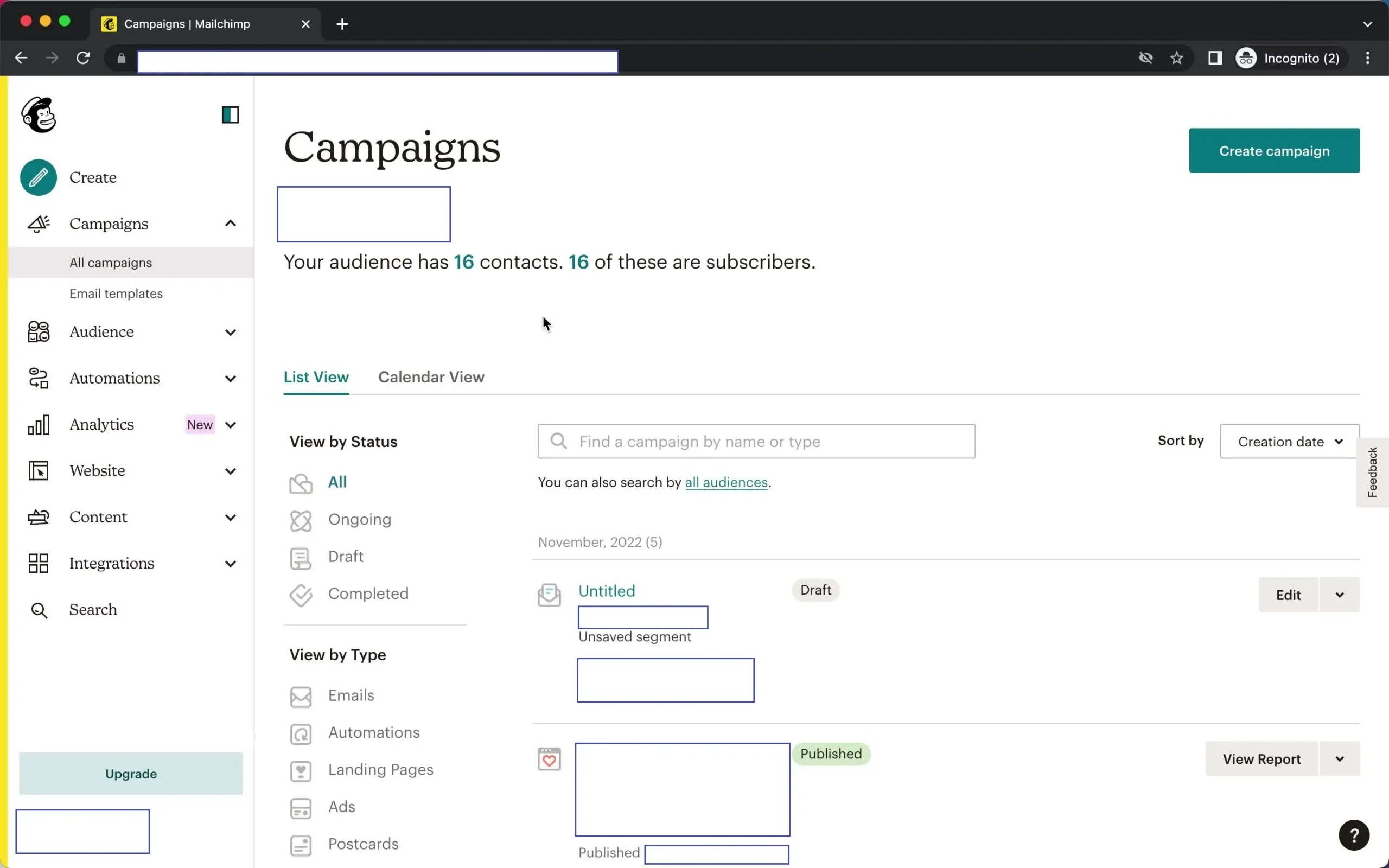
Mailchimp’s robust feature set is designed to support the entire customer journey, from lead generation to post-purchase engagement. By leveraging Mailchimp’s CRM capabilities, Shopify store owners can deliver personalized marketing messages, improve customer retention, and drive sales growth. The platform’s intuitive interface and affordable pricing further enhance its appeal, making it an excellent choice for businesses seeking a user-friendly and cost-effective CRM solution.
Key features
- Audience Dashboard: Mailchimp’s audience dashboard allows users to store contact data and track trends to better understand their audience. Clickable sections in the dashboard enable users to instantly launch campaigns based on the data insights.
- Segmentation: Mailchimp provides ready-made segments based on campaign activity, purchase history, and more. Users can send campaigns using up to five layers of segmentation filtering, and the data is updated automatically. This feature includes nested conditions that facilitate different combinations of collected data, such as purchase activity, gender, and age range.
- Behavioral Targeting: An API enables the pulling of custom event data or actions performed by users, allowing for targeted messages based on specific activities, such as downloads or account renewals. This feature ensures that messages are relevant and timely.
- Lookalike Audience: This feature works with social ads and postcards to reach new people similar to existing contacts using Mailchimp’s marketing CRM data and audience network. Users can create Facebook and Instagram ads to target individuals interested in the company’s products, expanding their reach.
- Reporting: Mailchimp provides robust reporting tools to monitor trends and track performance. Growth, engagement, and revenue reports help users see who’s interacted with their marketing efforts, including clicks, purchases, and downloads. Users can compare open, click, and unsubscribe rates to industry peers for benchmarking.
- Real-Time Analytics: Users can keep tabs on all marketing campaigns, including emails, automations, and social ads, with real-time analytics. This feature allows for effective budget management by using real-time stats and tracking sales from campaign to purchase. Users can find out who made a purchase after opening a campaign, see what they bought, and view the revenue generated.
- Integrations: Mailchimp integrates seamlessly with various apps and web services, including Shopify, Xero, Zapier, Square, LiveChat, and more. These integrations ensure that customer data and marketing efforts are synchronized across platforms, enhancing overall efficiency and effectiveness.
Pros and Cons
Pros
- Easy to Use: Mailchimp has a simple, intuitive interface that can be easily understood by anyone with basic knowledge of email marketing. This ease of use facilitates quick adoption and efficient campaign management.
- Customization: The platform offers built-in templates that are easily customizable. Users can edit these templates without needing graphic design experience, allowing for personalized and professional-looking email campaigns.
Cons
- Glitches: Users have reported various glitches, such as difficulty signing in from multiple devices, frozen modules, a slow editing process, and poor compatibility with Outlook. These issues can disrupt workflow and decrease productivity.
- More of an Email Marketing Tool than a CRM: While Mailchimp excels in email marketing, its CRM capabilities are more limited compared to dedicated CRM platforms. Businesses looking for extensive CRM features may find Mailchimp lacking in certain areas.
- Pricing Structure: Another significant drawback is the pricing structure, which escalates swiftly as the number of contacts, subscribers, and emails increases. This can make Mailchimp a costly option for businesses with large contact lists or high email volume.
Additional information and Overall evaluation
Deployment | Cloud-based |
Platforms | Linux - MacOS - Windows - ChromeOS - Android |
Mobile app | Android, iOS |
Price | Free: Limit of 500 contacts Essential: $13/month; 500 contacts Standard: $20/month; 500 contacts Premium: $350/month; 10,000 contacts |
Free Trial | 30 days |
Shopify Integration | Yes |
Suitable for | Small and medium-sized eCommerce business |
In conclusion, Mailchimp stands out as one of the best CRMs for Shopify stores, especially for small and medium-sized businesses that prioritize marketing over advanced CRM functionalities. Offering a robust set of marketing tools, Mailchimp excels in email marketing automation, customer segmentation, and analytics, making it an ideal choice for businesses looking to enhance their marketing efforts.
Mailchimp’s seamless integration with Shopify, user-friendly interface, and comprehensive feature set make it suitable for managing basic customer relationships and driving marketing campaigns. While there are some limitations in terms of advanced CRM features and customization options, these drawbacks are offset by Mailchimp’s strengths in marketing automation and customer engagement.
For Shopify store owners seeking a versatile and cost-effective solution, Mailchimp provides the essential tools needed to drive sales growth, improve customer engagement, and streamline marketing operations. Its ability to support the entire customer journey, from lead generation to post-purchase engagement, ensures that businesses can deliver personalized experiences and build lasting customer relationships. However, for those requiring extensive CRM features, other platforms might be more suitable.
Agile CRM
Agile CRM is recognized as one of the best CRMs for Shopify stores due to its comprehensive feature set, affordability, and seamless integration capabilities. Designed to meet the needs of small to medium-sized businesses, Agile CRM combines sales automation, marketing automation, and customer service in a single platform. This all-in-one solution ensures that Shopify store owners can manage their customer relationships, streamline their sales processes, and enhance their marketing efforts effectively.
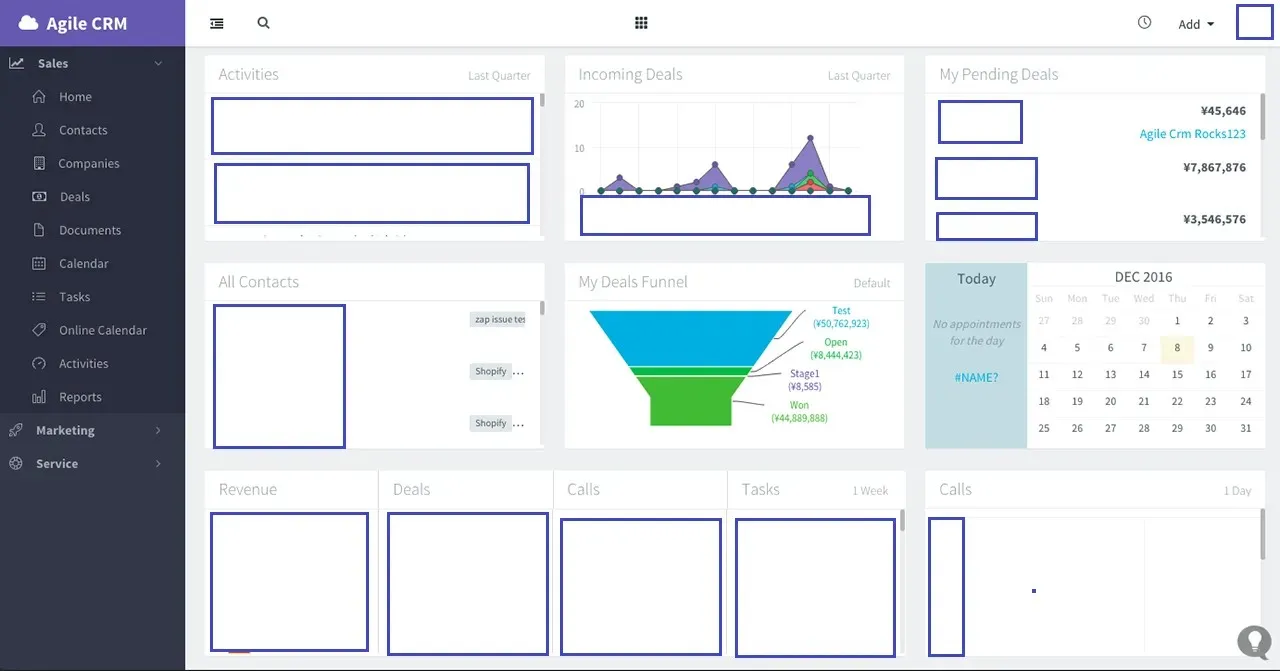
What sets Agile CRM apart is its ability to provide a unified view of customer interactions across various touchpoints. By integrating with Shopify, Agile CRM allows store owners to synchronize customer data, track sales activities, and automate marketing campaigns, all from a single dashboard. This integration ensures that businesses can deliver personalized experiences, improve customer satisfaction, and drive sales growth. Additionally, Agile CRM’s user-friendly interface and affordable pricing make it accessible to businesses with budget constraints.
Key features
- Social CRM: Agile CRM enables sales, marketing, and service teams to seamlessly integrate social channels into their operations through integrations with Facebook, Twitter, Google Plus, and Tower Data. This feature supports scheduled posts, social media campaigns, help desk responses, lead discovery, and more, ensuring that social media efforts are fully integrated into the overall customer relationship strategy.
- Contact Management: Agile CRM helps build data-rich customer profiles, share information across teams, and track interactions via timelines to maintain data integrity throughout the customer lifecycle. The platform includes capabilities such as bulk actions, contact import, custom fields, tags, and advanced filters, making it easy to manage and organize customer data.
- Sales Pipelines: Agile CRM provides multiple pipelines to support different workflow needs. The drag-and-drop interface and customizable milestones make it easy to track and manage sales opportunities, ensuring that the sales process is efficient and transparent.
- Document Management: Agile CRM facilitates contract and proposal management with native templates or uploaded documents. The e-signature functionality speeds up the process, and comment tracking provides a full history of interactions, making document management seamless and efficient.
Pros and Cons
Pros
- Automation: Agile CRM helps eliminate manual work by automating various actions required for sales, marketing, and customer service processes. This automation enhances efficiency and allows teams to focus on more strategic tasks.
- Ease of Use: The platform is designed to be user-friendly, simplifying tasks and making it easy for users to navigate and utilize its features effectively.
- Easy Integrations and Customization: Agile CRM offers powerful features and seamless integrations with various third-party applications. This helps scale productivity and speed up workflows, allowing businesses to tailor the system to their specific needs.
Cons:
- No Modern Templates: The platform could benefit from newer and more modern email templates to improve the visual appeal and effectiveness of email marketing campaigns.
- Difficult Setup: Initial setup can be intimidating and challenging for new users, requiring time and effort to configure the system properly.
- Clunky User Interface: The user interface is considered outdated and not very interactive, which can affect the overall user experience and efficiency.
Additional information and Overall evaluation
Deployment | Cloud-based |
Platforms | Linux - MacOS - Windows - Android |
Mobile app | Android, iOS |
Price | Free: 10 users Starter: $14.99/user/month Regular: $49.99/user/month Enterprise: $79.99/user/month |
Free Trial | No |
Shopify Integration | Yes |
Suitable for | Small and medium-sized eCommerce business |
Agile CRM is a top contender among the best CRMs for Shopify stores, offering a comprehensive suite of features designed to enhance sales, marketing, and customer service efforts. Targeted primarily at small and medium-sized businesses, Agile CRM allows users to maintain visibility into contacts, boost results with sales enablement, engage web users, and deliver comprehensive support. Its seamless integration with Shopify, user-friendly interface, and competitive pricing make it an ideal choice for these businesses looking to improve their customer relationship management and drive growth.
While there are some limitations in terms of interface and initial setup, the overall benefits of using Agile CRM far outweigh these drawbacks. The platform is available in both free and premium versions, providing flexibility to meet the varying needs and budgets of small and medium-sized businesses.
For Shopify store owners seeking a versatile and cost-effective CRM solution, Agile CRM provides the tools and capabilities needed to build stronger customer relationships, streamline operations, and achieve long-term success in the competitive world of eCommerce. By choosing Agile CRM as their CRM solution, Shopify store owners can ensure they are well-equipped to meet the demands of their customers, enhance their marketing efforts, and drive sales growth, positioning themselves for success in the dynamic eCommerce landscape.
Salesforce CRM
Salesforce CRM is renowned as one of the most powerful and comprehensive customer relationship management solutions available today. Its robust feature set, scalability, and extensive integration capabilities make it an excellent choice for Shopify stores looking to enhance their customer relationship management. Salesforce is designed to cater to businesses of all sizes, from small startups to large enterprises, providing the flexibility and functionality needed to support growth and drive sales.
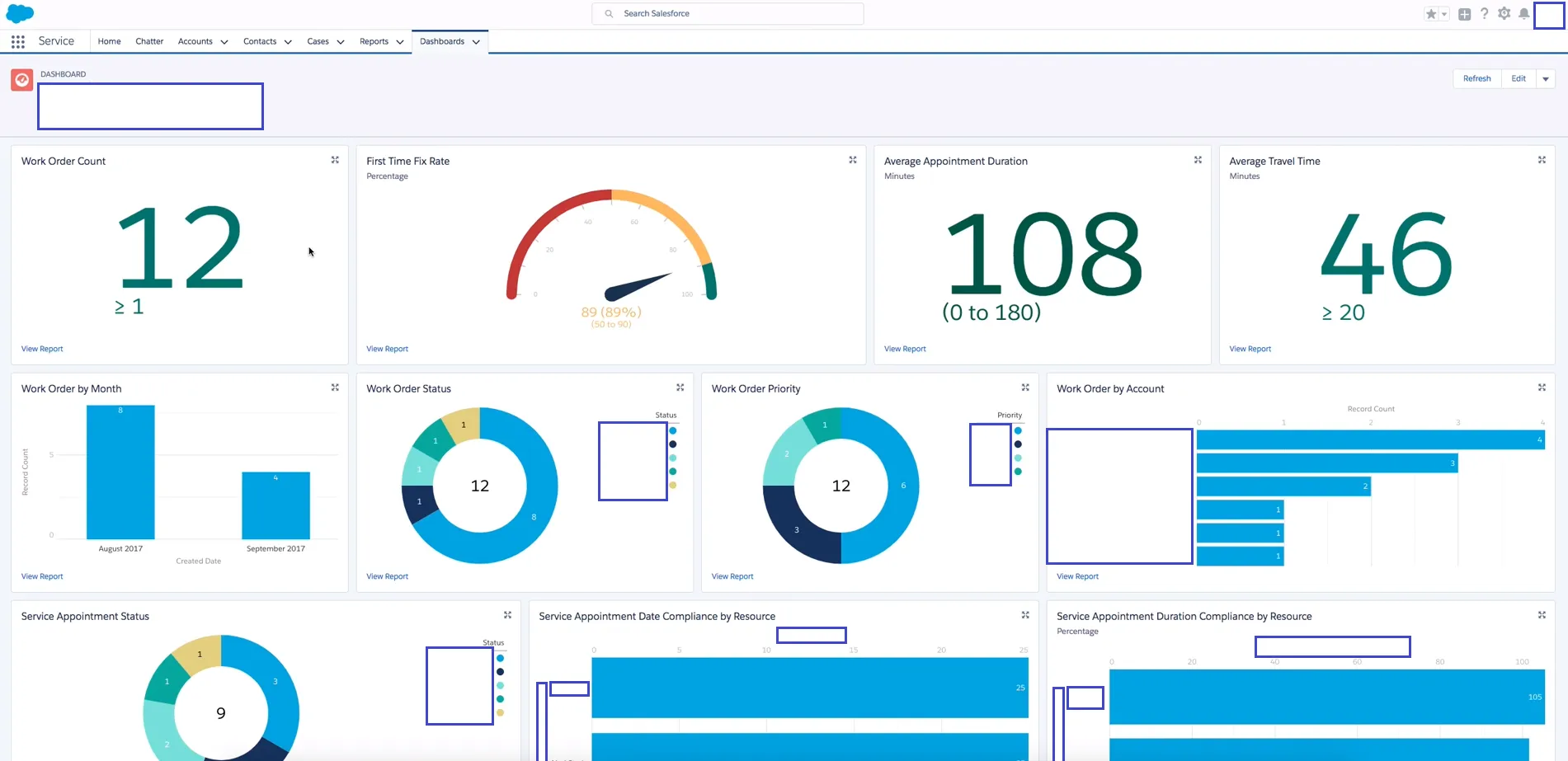
What sets Salesforce apart as the best for Shopify stores is its ability to provide a 360-degree view of the customer. By integrating seamlessly with Shopify, Salesforce allows store owners to synchronize customer data, track sales activities, and automate marketing campaigns from a single platform. This integration ensures that businesses can deliver personalized experiences, improve customer satisfaction, and drive sales growth. Additionally, Salesforce’s advanced analytics and reporting capabilities provide valuable insights into customer behavior and sales performance, enabling data-driven decision-making.
Key features
- Sales Cloud: Salesforce’s Sales Cloud provides robust sales automation tools, including lead management, opportunity tracking, and sales forecasting. These features help sales teams manage their pipelines efficiently and close deals faster.
- Marketing Cloud: The Marketing Cloud offers advanced marketing automation capabilities, such as email marketing, social media integration, and customer journey mapping. Users can create personalized marketing campaigns and automate workflows to nurture leads and engage customers.
- Service Cloud: Salesforce’s Service Cloud includes customer service tools like case management, a knowledge base, and live chat. These features ensure that customer queries are addressed promptly, improving overall customer satisfaction and retention.
- Einstein Analytics: Salesforce’s AI-powered analytics tool, Einstein Analytics, provides deep insights into sales performance, customer behavior, and marketing effectiveness. Customizable dashboards and reports make it easy to monitor key metrics and make data-driven decisions.
- AppExchange: Salesforce’s AppExchange offers a vast marketplace of third-party apps and integrations, including Shopify. This allows businesses to extend Salesforce’s functionality and tailor the CRM to their specific needs.
Pros and Cons
Pros
- Highly Customizable: Salesforce offers extensive customization options, allowing businesses to personalize the platform to manage tasks efficiently and meet their specific needs.
- Accurate Data and Analytics: The system provides a robust catalog for data and analytics, categorizing tasks using performance metrics to deliver accurate insights.
- Intuitive AI: Salesforce’s AI capabilities are highly intuitive, helping to drive team productivity by offering intelligent suggestions and automating routine tasks.
- User-Friendly: Despite its extensive features, Salesforce CRM is user-friendly and doesn’t require technical knowledge, making it easy for teams to adapt to the software.
- Communication Tools: Salesforce includes automatic call recording, email and call customization, and automation, improving overall customer communication and record-keeping.
Cons:
- Clunky and Slow: The software is heavy on network resources and can take time to install. It is best not run on mobile network connectivity to avoid poor speed and performance issues.
- Outdated UI: The user interface and interactiveness of the application are outdated and in need of an upgrade to enhance user experience.
- Weak Automation: The marketing automation feature lacks the ability to generate suggestions and implement organizational conversations, which can make functionality challenging.
- Too Many Features: Salesforce offers a wide array of features that can be overwhelming, and some additional features may be complex to use and unnecessary for certain business needs.
Additional information and Overall evaluation
Deployment | Cloud-based, On Premise |
Platforms | Linux - MacOS - Windows - ChromeOS - Android |
Mobile app | Android, iOS |
Price | Free Standard: $9.10/user/month Custom: $13.60/user/month |
Free Trial | 1 module |
Shopify Integration | Yes |
Suitable for | All-sized eCommerce businesses |
Odoo
Odoo CRM is recognized as one of the best CRMs for Shopify stores due to its comprehensive suite of business applications that go beyond traditional customer relationship management. Designed to cater to businesses of all sizes, Odoo CRM provides an all-in-one solution that integrates seamlessly with Shopify, offering a unified platform to manage sales, marketing, customer service, and more. The flexibility and scalability of Odoo CRM make it an ideal choice for Shopify store owners who need a customizable and robust CRM solution to drive growth and enhance customer engagement.
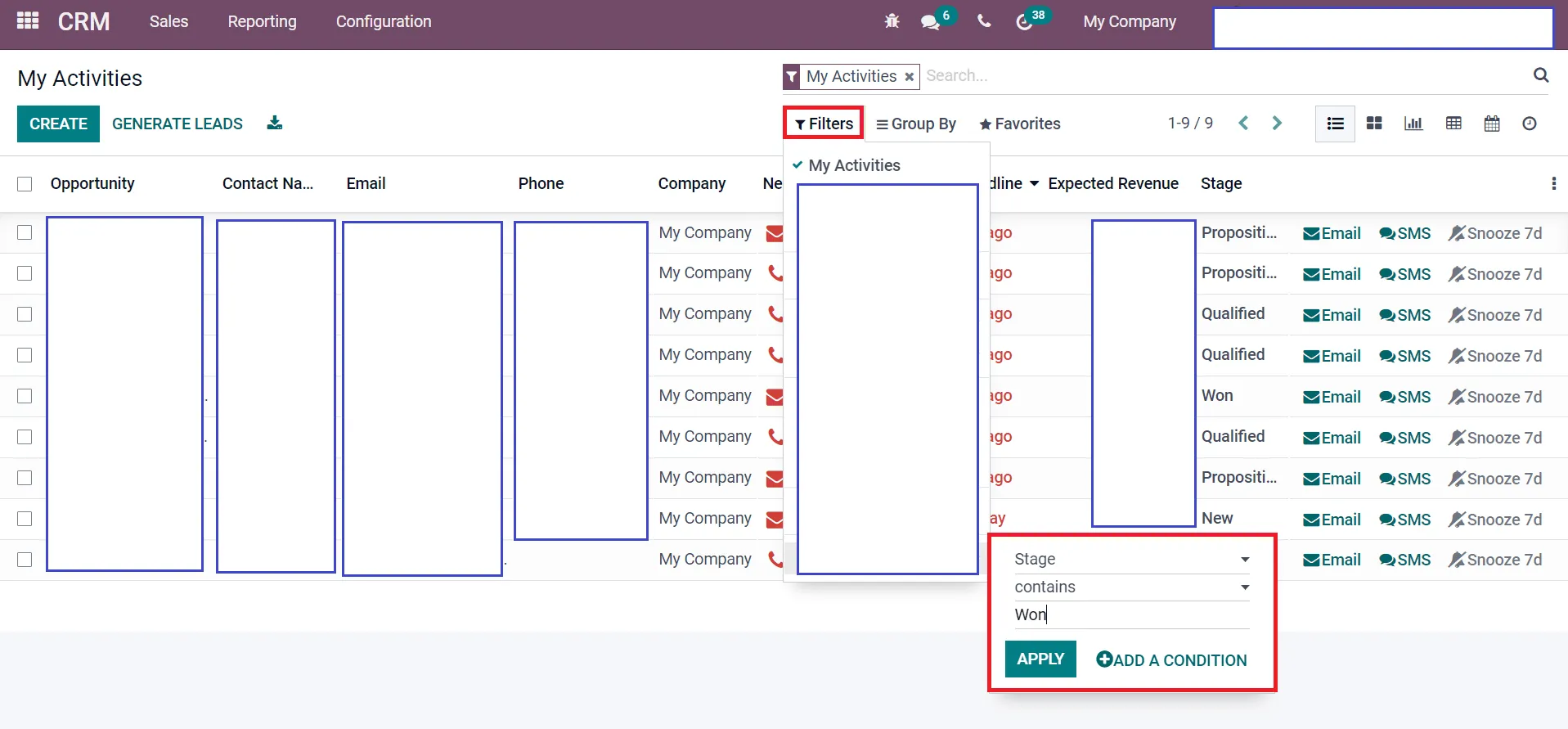
Odoo CRM’s ability to integrate with Shopify ensures that store owners can synchronize customer data, manage sales pipelines, and automate marketing campaigns from a single interface. This integration provides a holistic view of customer interactions, enabling businesses to deliver personalized experiences and improve customer satisfaction. Additionally, Odoo CRM’s modular approach allows businesses to start with the basics and add more features as they grow, ensuring that the CRM evolves with their needs.
Key features
- Sales Pipeline Management: Odoo CRM provides a visual sales pipeline that helps users track and manage their sales opportunities from start to finish. The drag-and-drop interface allows for easy customization and real-time updates, ensuring that the sales process is transparent and efficient.
- Email Marketing Automation: The platform includes advanced email marketing tools that allow users to create, send, and automate email campaigns. Features such as customizable templates, A/B testing, and automated workflows help optimize email marketing efforts and improve engagement rates.
- Lead Management: Odoo CRM offers comprehensive lead management tools, including lead scoring, segmentation, and tracking. This helps sales teams prioritize high-value prospects and focus their efforts on the most promising leads.
- Customer Segmentation: The platform enables users to segment their audience based on various criteria, such as purchase history, engagement levels, and demographic information. This allows for highly targeted marketing campaigns that resonate with specific customer groups.
- Integration with Shopify: Odoo CRM integrates seamlessly with Shopify, syncing customer data, purchase history, and website activity. This integration ensures that all customer interactions are tracked and recorded, providing a complete view of the customer journey.
- Reporting and Analytics: Odoo CRM offers robust reporting and analytics tools that provide insights into sales performance, customer behavior, and marketing effectiveness. Customizable dashboards and reports make it easy to monitor key metrics and make data-driven decisions.
- Customer Support Tools: The platform includes customer service tools such as a helpdesk, ticketing system, and knowledge base. These features ensure that customer queries are addressed promptly, improving overall customer satisfaction and retention.
- Social Media Integration: Odoo CRM supports integration with various social media platforms, allowing businesses to manage their social media marketing efforts directly from the CRM. This helps streamline marketing activities and enhance brand presence.
- Customization and Scalability: The modular design of Odoo CRM allows businesses to start with essential features and add more as needed. This scalability ensures that the CRM grows with the business and adapts to changing requirements.
Pros and Cons
Pros
- Functionality: Odoo CRM provides robust features to manage the entire business, encompassing sales, marketing, customer service, and more, making it a comprehensive solution for Shopify stores.
- Navigation: Odoo offers an intuitive, simple, and modular user interface, ensuring a seamless user experience. The design makes it easy for users to navigate and access the features they need.
- Customization: While some web-development knowledge or Python coding skills are needed to fully customize the system, Odoo’s customization capabilities are extensive. Businesses can tailor the platform to meet their specific needs and workflows.
- Integration: The suite of integrated applications within Odoo and the opportunities for third-party integrations ensure that all business processes are streamlined and data is synchronized across platforms.
Cons
- Support: Users have reported long wait times and unsatisfactory responses from the Odoo customer support team, which can be frustrating when dealing with issues or seeking assistance.
- Documentation: There is a lack of proper guidance and documentation to help users complete customizations, making it challenging for those who are not highly technical.
- Bugs and Performance: Some users experience slow performance and occasional bugs, which can disrupt workflows and affect productivity.
- Difficult, Lengthy Implementations: Implementing Odoo can be a complex and time-consuming process, requiring careful planning and execution to ensure all features are set up correctly.
Additional information and Overall evaluation
Deployment | Cloud-based, On Premise |
Platforms | Linux - MacOS - Windows - ChromeOS - Android |
Mobile app | Android, iOS |
Price | Free Standard: $9.10/user/month Custom: $13.60/user/month |
Free Trial | 1 module |
Shopify Integration | Yes |
Suitable for | All-sized eCommerce businesses |
Odoo CRM is an excellent choice for Shopify store owners seeking a powerful and comprehensive CRM solution. Its seamless integration with Shopify, extensive feature set, and modular design make it one of the best CRMs for managing customer relationships and driving sales growth. Suitable for businesses of all sizes, Odoo CRM provides the flexibility and scalability needed to support growth and accommodate evolving business needs.
Odoo’s open-source model and strong technical foundation make it highly developer-friendly, allowing users to customize the platform to meet their specific requirements. This customization capability is particularly beneficial for businesses with unique needs. Additionally, Odoo’s relatively low cost of ownership and ability to centralize all business processes offer significant opportunities for cost reduction. The platform’s integration capabilities enable users to work from one centralized location, ultimately saving time and improving efficiency.
While there are some considerations regarding complexity and the initial setup process, the benefits of improved sales productivity, enhanced customer insights, and streamlined operations far outweigh these potential drawbacks. For Shopify store owners aiming to take their business to the next level, Odoo CRM provides the tools and capabilities needed to build stronger customer relationships, drive sales growth, and achieve long-term success in the competitive world of eCommerce.
By choosing Odoo CRM as their CRM solution, Shopify store owners can ensure they are well-equipped to meet the demands of their customers, enhance their marketing efforts, and drive sales growth, positioning themselves for success in the dynamic eCommerce landscape.
Klaviyo
Klaviyo stands out as one of the best CRMs for Shopify stores due to its powerful email marketing and automation capabilities tailored specifically for eCommerce businesses. Klaviyo’s deep integration with Shopify allows store owners to harness customer data and behavior to create personalized, targeted marketing campaigns that drive engagement and sales. This seamless integration ensures that every customer interaction is tracked and utilized to enhance the customer journey, making Klaviyo an indispensable tool for Shopify store owners aiming to maximize their marketing efforts and improve customer relationships.
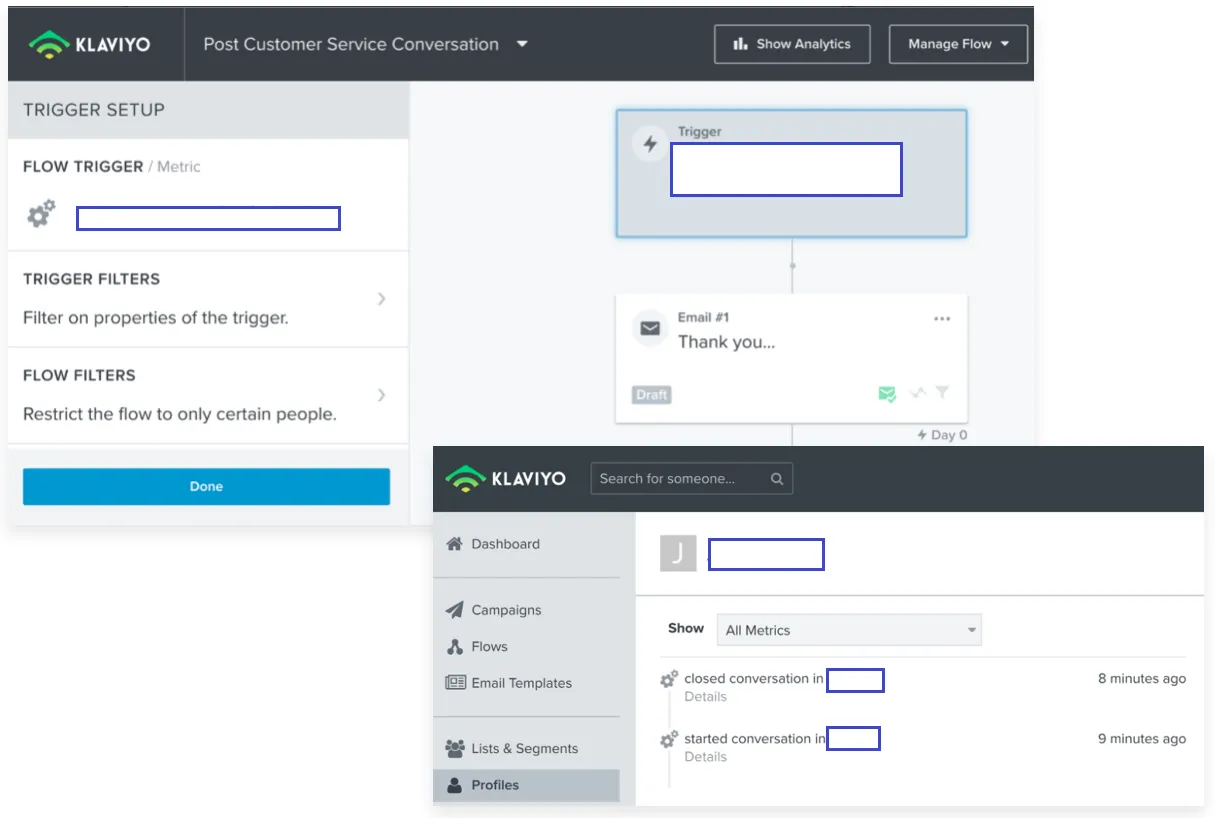
One of Klaviyo’s key strengths is its ability to provide detailed insights and analytics, enabling businesses to make data-driven decisions. By leveraging these insights, Shopify store owners can tailor their marketing strategies to meet the specific needs and preferences of their customers, ultimately leading to higher conversion rates and increased revenue. Additionally, Klaviyo’s user-friendly interface and robust feature set make it accessible for businesses of all sizes, from small startups to large enterprises.
Key features
- Customer Relationships: Klaviyo enables businesses to attend to customers effectively by collecting and storing important customer information. This data can be used to personalize marketing efforts according to customer consent, enhancing customer relationships and satisfaction.
- Analysis: Klaviyo leverages data science and AI to understand customer trends through segmented market data. This analysis provides valuable business insights that help accelerate growth by making data-driven decisions.
- Integrations: Klaviyo offers unlimited real-time data through robust, ready-to-go integrations, providing deeper audience insights and personalization. It connects seamlessly with Shopify, WooCommerce, Magento, and more. An open API allows for the flexibility to create direct integrations with custom eCommerce platforms.
- Reporting: Klaviyo allows users to run comprehensive reports from a single screen and export data easily. Businesses can quickly understand the performance of their flows, campaigns, and signup forms. Custom analytics tools help assess the performance of emails and identify opportunities for improvement.
- Social Media Advertising: Klaviyo facilitates the transfer of data to Facebook and Instagram, enabling the creation of relevant messages and delivering consistent customer experiences. The platform syncs data dynamically, generating more sales by automatically updating target groups with product-specific ads.
Pros and Cons
Pros
- Analytics: Klaviyo offers robust analysis capabilities, providing deep insights into customer behavior, campaign performance, and sales trends. These insights help businesses make data-driven decisions to optimize their marketing efforts and drive growth.
- Ease of Use: The platform features a user-friendly interface and easy-to-customize email templates, making it accessible for users with varying levels of technical expertise.
- Segmentation: One of Klaviyo’s key benefits is its advanced segmentation capabilities, allowing businesses to create highly targeted marketing campaigns based on customer behavior, purchase history, and other criteria.
Cons
- Training: The lack of comprehensive training resources can pose a challenge for businesses during the implementation and setup phases.
- Steep Learning Curve for Advanced Functionality: While the basic features are user-friendly, there is a steep learning curve associated with mastering Klaviyo’s more advanced functionalities.
- Slow Automatic Import of Products: Users have reported slow automatic import of products, which can be a hindrance for businesses with large inventories.
Additional information and Overall evaluation
Deployment | Cloud-based |
Platforms | Linux - MacOS - Windows - ChromeOS - Android |
Mobile app | Android, iOS |
Price | Standard: $20/user/month Professional: $35/user/month Enterprise: $50/user/month Ultimate: $65/user/month |
Free Trial | 15 days |
Shopify Integration | Yes |
Suitable for | All-sized eCommerce Business |
Klaviyo is an outstanding choice for Shopify store owners seeking a powerful and specialized CRM solution focused on email marketing and automation. Its seamless integration with Shopify, advanced analytics, and robust personalization features make it one of the best CRMs for managing customer relationships and driving sales growth. Particularly well-suited for businesses aiming to enhance customer engagement, Klaviyo excels at delivering personalized messages based on customer behavior and preferences.
While there are some considerations regarding pricing, the learning curve, and the absence of a mobile app, the benefits of improved marketing effectiveness, enhanced customer insights, and streamlined operations far outweigh these potential drawbacks. For Shopify store owners aiming to take their marketing to the next level, Klaviyo provides the tools and capabilities needed to deliver personalized experiences, recover lost sales, and achieve long-term success in the competitive world of eCommerce.
By choosing Klaviyo as their CRM solution, Shopify store owners can ensure they are well-equipped to meet the demands of their customers, enhance their marketing efforts, and drive sales growth, positioning themselves for success in the dynamic eCommerce landscape.
Zoho
Zoho CRM stands out as one of the best CRMs for Shopify stores due to its robust features, flexibility, and scalability designed to support businesses of all sizes. Known for its extensive suite of applications, Zoho CRM integrates seamlessly with Shopify, providing a unified platform to manage sales, marketing, customer service, and inventory management. This integration ensures that Shopify store owners can streamline their operations, gain valuable customer insights, and drive business growth through enhanced customer relationship management.
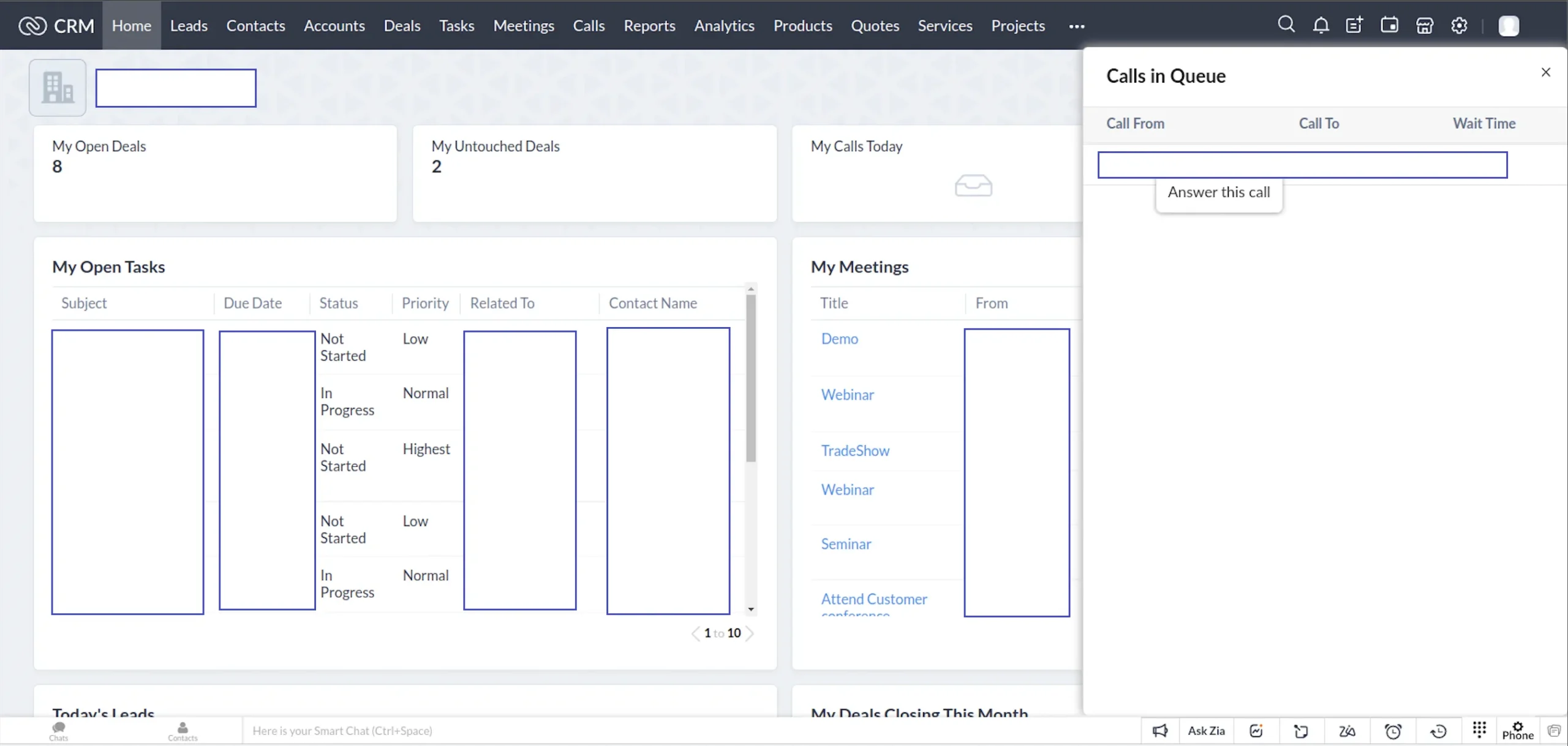
Zoho CRM’s powerful automation tools and advanced analytics capabilities make it an ideal choice for Shopify store owners aiming to enhance their marketing efforts and improve customer engagement. With Zoho CRM, businesses can automate routine tasks, personalize customer interactions, and make data-driven decisions to boost sales. The platform’s user-friendly interface and comprehensive features ensure that businesses can effectively manage their customer relationships, making Zoho CRM a top contender for the best CRM for Shopify stores.
Key features
- Process Management: This module enables sales teams to follow standardized sales strategies using the blueprint feature to log offline processes like order management or deal closure. It automates approvals for activities such as vacation requests, expense reports, and pricing discounts. Rules can be set for assigning leads, escalating cases, and validating CRM data, supporting sales processes across multiple departments.
- Multichannel Support: Zoho CRM connects with email platforms, social media channels, and telephony systems. It allows real-time responses, automates lead generation, and facilitates sales, marketing, and customer service efforts with embedded live chat and lead capture forms.
- Performance Management: Zoho CRM includes forecasting tools, territory management, gamification elements, and AI-driven assistance from Zia. Sales reps can engage with website visitors via chatbots for web and mobile, ensuring queries are attended to even when they are away.
- Marketing Automation: The platform automates marketing efforts through customer segmentation, lead nurturing, web forms, business card scanning, campaign analysis, event management, email campaigns, surveys, and budget and performance metrics.
- Third-Party Integrations: Zoho CRM integrates with over 50 third-party apps, including but not limited to Shopify, Office 365, Facebook Ads, QuickBooks, DocuSign, Dropbox, and Zapier, enhancing collaboration, document management, live chat, telephony, marketing automation, social media, and more.
Pros and Cons
Pros
- Work Offline: Zoho CRM functions well even when used in offline mode, allowing users to access and manage data without an internet connection.
- Business Management: The platform effectively monitors business performance, populates websites with suitable visitors, and tracks productivity and output. It helps eliminate unmatched customers and reduces hassle.
- Integrations: Zoho CRM supports unified workflows, offers flexibility, and includes robust email functionality. It integrates seamlessly with numerous third-party applications.
- Security: Zoho CRM provides robust security measures, including audit logs, two-factor authentication, and IP address restrictions. Real-time backups on multiple servers ensure data safety in case of system failures or natural disasters.
Cons
- User Interface: The interface is not very user-friendly or adaptive, which can affect usability.
- Customer Support: Zoho’s customer support and inquiry resolution are not very responsive, leading to potential delays in issue resolution.
- Automation: Automation capabilities are limited to the enterprise version, which can restrict productivity for users on other plans.
- Customizations: The customization options could be more extensive, including real page customizations, drop boxes, fonts, and other features to enhance user experience.
Additional information and Overall evaluation
Deployment | Cloud-based |
Platforms | Linux - MacOS - Windows - ChromeOS - Android |
Mobile app | Android, iOS |
Price | Standard: $20/user/month Professional: $35/user/month Enterprise: $50/user/month Ultimate: $65/user/month |
Free Trial | 15 days |
Shopify Integration | Yes |
Suitable for | All-sized eCommerce Business |
Zoho CRM is an outstanding choice for Shopify store owners seeking a powerful and comprehensive CRM solution. Its seamless integration with Shopify, extensive feature set, and advanced analytics make it one of the best CRMs for managing customer relationships and driving sales growth. Suitable for businesses of all sizes, Zoho CRM provides the flexibility and scalability needed to support growth and accommodate evolving business needs.
Zoho CRM’s ability to function offline, monitor business performance, and offer robust security measures adds significant value for Shopify store owners. The platform effectively populates websites with suitable visitors, tracks productivity, and ensures data safety through real-time backups and stringent security protocols. Additionally, Zoho CRM’s integration capabilities support unified workflows, enhancing overall business efficiency.
Even though there are still some considerations regarding the user interface, limited automation for non-enterprise versions, and the lack of extensive customization options; the benefits of improved sales productivity, enhanced customer insights, and streamlined operations far outweigh the potential challenges.
For Shopify store owners aiming to take their business to the next level, Zoho CRM provides the tools and capabilities needed to build stronger customer relationships, drive sales growth, and achieve long-term success in the competitive world of eCommerce. By choosing Zoho CRM as their CRM solution, Shopify store owners can ensure they are well-equipped to meet the demands of their customers, enhance their marketing efforts, and drive sales growth, positioning themselves for success in the dynamic eCommerce landscape.
ActiveCampaign
ActiveCampaign stands out as one of the best CRMs for Shopify stores due to its robust marketing automation capabilities, comprehensive customer relationship management tools, and seamless integration with Shopify. Designed to cater to businesses of all sizes, ActiveCampaign provides a unified platform that helps Shopify store owners streamline their marketing efforts, automate workflows, and manage customer relationships effectively. This powerful combination ensures that businesses can enhance customer engagement, drive sales, and achieve long-term growth.
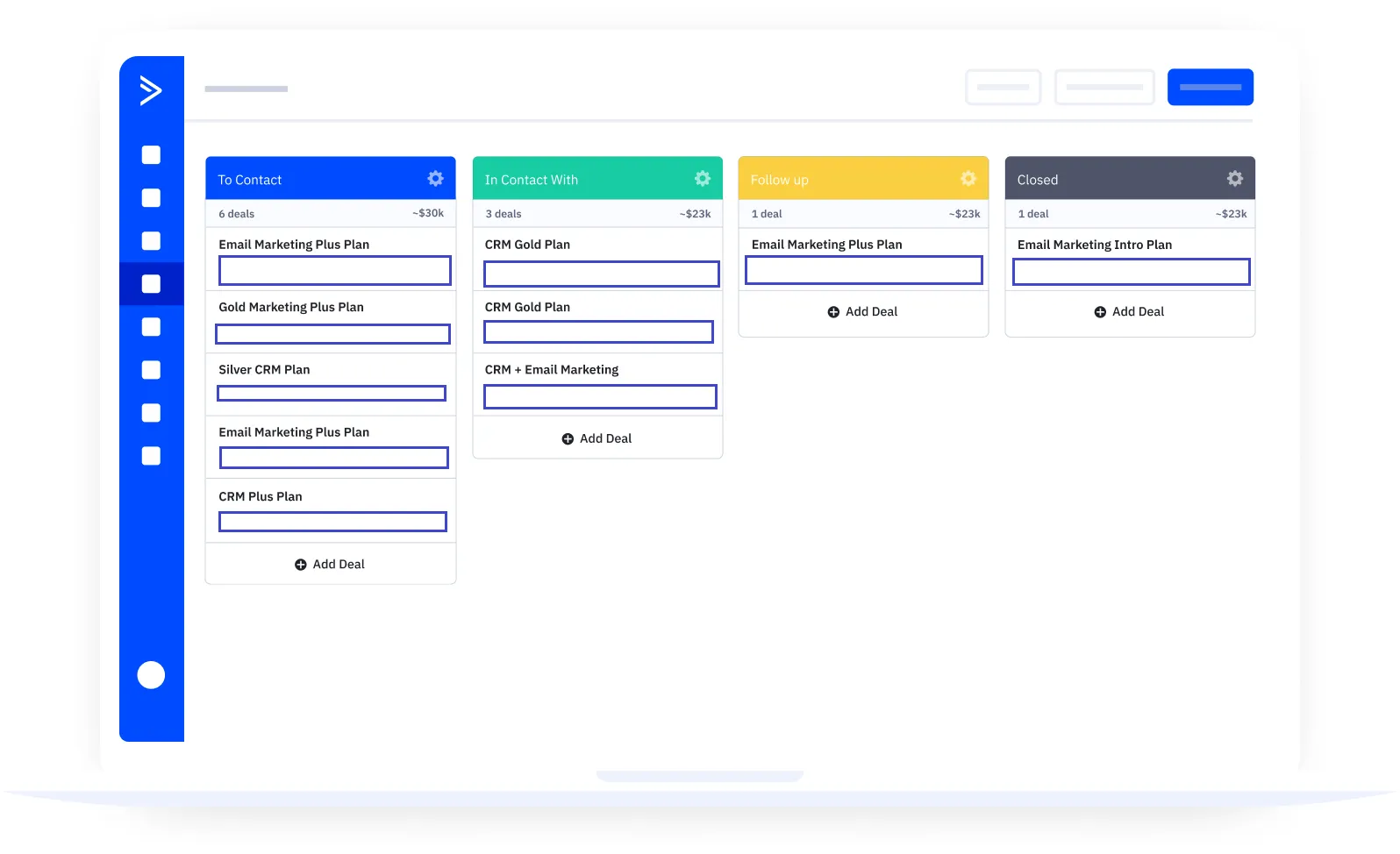
What sets ActiveCampaign apart as the best CRM for Shopify stores is its ability to deliver highly personalized customer experiences through advanced segmentation, automation, and analytics. By integrating seamlessly with Shopify, ActiveCampaign allows store owners to synchronize customer data, track interactions, and create targeted marketing campaigns that resonate with their audience. The platform’s user-friendly interface and extensive feature set make it accessible and beneficial for both small businesses and large enterprises.
Key Features
- Marketing Automation: ActiveCampaign excels in marketing automation, providing tools to create, send, and optimize email campaigns. Features such as customizable templates, A/B testing, and automated workflows help businesses engage with customers effectively and increase conversion rates.
- Customer Segmentation: The platform enables users to segment their audience based on various criteria, including purchase history, browsing behavior, and engagement levels. This allows for highly targeted marketing campaigns that are tailored to specific customer groups.
- CRM and Sales Automation: ActiveCampaign offers robust CRM and sales automation tools, including contact management, deal tracking, lead scoring, and sales forecasting. These features help sales teams manage their pipelines efficiently and close deals faster.
- Email Marketing: ActiveCampaign provides advanced email marketing capabilities, allowing users to create personalized email content, track email performance, and optimize campaigns for better engagement and results.
- Integration with Shopify: ActiveCampaign integrates seamlessly with Shopify, syncing customer data, purchase history, and website activity. This integration ensures that all customer interactions are tracked and recorded, providing a complete view of the customer journey.
- Site Tracking and Event Tracking: The platform includes site tracking and event tracking features that monitor customer behavior on your website. This data can be used to trigger automated campaigns and personalize customer interactions based on real-time activity.
- Advanced Analytics and Reporting: ActiveCampaign offers robust analytics and reporting tools that provide insights into campaign performance, customer behavior, and sales trends. Customizable dashboards and reports make it easy to monitor key metrics and make data-driven decisions.
Pros and Cons
Pros
- User-Friendly: ActiveCampaign is designed with ease of use in mind, making it accessible for users with varying levels of technical expertise.
- Automation: The platform excels in automation, allowing businesses to run customer and lead campaigns that are triggered automatically based on predefined specifications.
- Functionalities: ActiveCampaign offers robust capabilities, including client onboarding, lead funnels, newsletters, contact tracking, and more, making it a versatile tool for managing customer relationships.
- Integration: The seamless integration with Shopify and other platforms facilitates easy transfer of leads and synchronization of data, enhancing overall efficiency.
- Help Resource: ActiveCampaign’s support team is easy to reach and very responsive. The platform also offers helpful tutorials and webinars to assist users in getting the most out of the software.
Cons
- Learning Curve: Despite its user-friendly design, the platform can be tough and time-consuming to learn, especially when it comes to mastering advanced features.
- Glitches: Users have reported occasional glitches and slow loading times during peak business hours, which can disrupt workflow and productivity.
- Interface: The interface can be slow and is not very intuitive, which may affect the overall user experience.
Additional information and Overall evaluation
Deployment | Cloud-based |
Platforms | Linux - MacOS - Windows |
Mobile app | Android, iOS |
Price | Essential: $14/user/month Advanced: $29/user/month Professional: $59/user/month Power: $69/user/month Enterprise: $99/user/month |
Free Trial | 14 days |
Shopify Integration | Yes |
Suitable for | All-sized eCommerce Business |
In conclusion, ActiveCampaign is an outstanding choice for Shopify store owners seeking a powerful and specialized CRM solution focused on marketing automation and customer relationship management. Its seamless integration with Shopify, advanced analytics, and robust automation features make it one of the best CRMs for managing customer relationships and driving sales growth. Particularly well-suited for businesses aiming to enhance customer engagement and deliver personalized experiences, ActiveCampaign excels at creating targeted marketing campaigns based on customer behavior and preferences.
ActiveCampaign’s robust capabilities, including client onboarding, lead funnels, newsletters, and contact tracking, provide comprehensive tools to boost sales and improve customer relationships. The seamless integration with Shopify and other platforms simplifies lead transfers and data synchronization, enhancing operational efficiency.
While there are some considerations regarding the learning curve, occasional glitches, and interface intuitiveness, the benefits of improved marketing effectiveness, enhanced customer insights, and streamlined operations far outweigh these potential drawbacks. For Shopify store owners aiming to take their marketing to the next level, ActiveCampaign provides the tools and capabilities needed to deliver personalized experiences, recover lost sales, and achieve long-term success in the competitive world of eCommerce.
By choosing ActiveCampaign as their CRM solution, Shopify store owners can ensure they are well-equipped to meet the demands of their customers, enhance their marketing efforts, and drive sales growth, positioning themselves for success in the dynamic eCommerce landscape.
Pipedrive
Pipedrive is widely regarded as one of the best CRMs for Shopify stores, offering a robust and intuitive platform designed to streamline sales processes and enhance customer relationship management. Pipedrive’s primary focus is on sales pipeline management, making it an ideal choice for Shopify store owners who need a CRM that excels in tracking deals, managing leads, and improving sales efficiency. The platform’s ease of use, combined with its powerful features, ensures that businesses can optimize their sales strategies and drive growth.
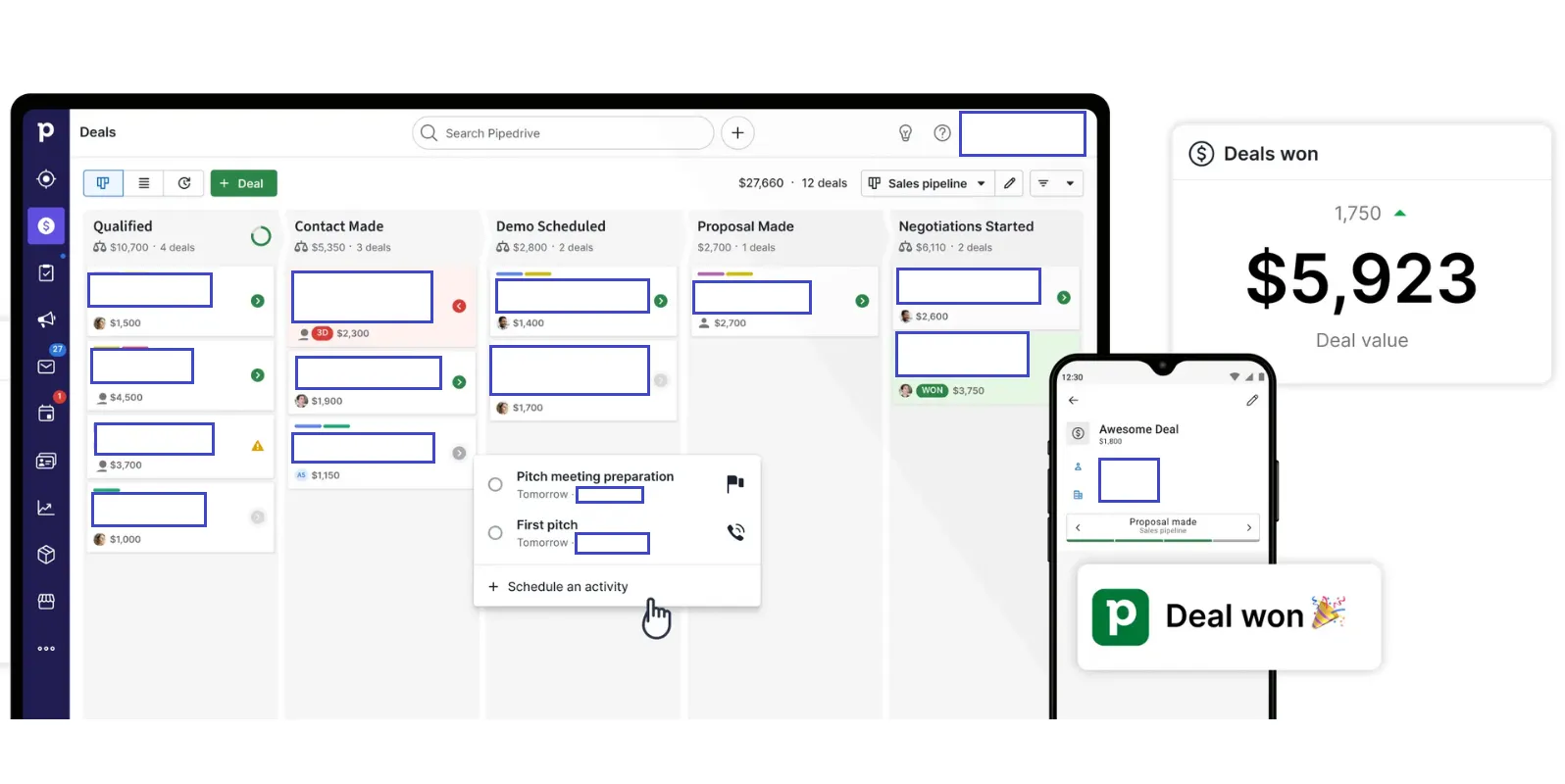
Pipedrive’s seamless integration with Shopify allows store owners to synchronize customer data, track sales activities, and gain valuable insights into customer behavior. This integration provides a holistic view of the sales process, enabling businesses to make data-driven decisions and deliver personalized experiences. Pipedrive’s emphasis on simplicity and effectiveness makes it particularly appealing to small and medium-sized businesses looking to enhance their sales operations without the complexity often associated with more extensive CRM systems.
Key features
- Lead Management: Pipedrive includes a product catalog, lead import tools, and deal probability, in addition to visual pipelines. A color-coded feature called “rotting” uses different colors to represent the status of leads, providing visibility into which leads require follow-up or are best to pursue.
- Contact Management: Users can import contacts from a previous CRM or spreadsheets, or sync from Microsoft or Google. Contacts are stored as organizations and people, which can be attached to deals. The system records and provides access to a history of interactions, clarifying the status of each contact. Integration with Google Maps allows users to view contact locations.
- Web Forms: Pipedrive allows businesses to generate leads via web forms embedded on their website or shared in emails and social media channels. Fields can be customized to capture personal details specific to company needs, and users can configure where the leads appear (e.g., as a deal or contact).
- Leadbooster Chatbot: This feature collects and qualifies leads 24/7, routing them to custom destinations, such as a specific stage or sales rep. Calendar syncing lets leads book meetings with sales reps directly from the chatbot conversation.
- Activity Management: Pipedrive contains a scheduling tool, reminder notifications, and a premade list of activity types, which can be configured based on company needs. This helps ensure that important activities are not missed and enhances productivity.
- Sales Forecasting: Pipedrive provides sales forecasting tools that help businesses pursue the best deals and effectively plan strategies for open deals. This feature aids in making informed decisions based on predicted sales outcomes.
- Integration: Pipedrive integrates with dozens of other apps, including Shopify, allowing further integration with third-party tools. This seamless connectivity enhances overall business efficiency and ensures that customer data is synchronized across platforms.
Pros and Cons
Pros
- Sales Pipeline: Pipedrive is excellent for keeping a close eye on deals at every stage and tracking individual progress to understand outcomes. Its visual pipeline management makes it easy to see where each deal stands.
- User Interface: The user interface is functional and easy to use, providing a smooth experience for users with varying levels of technical expertise.
- Integrations: Pipedrive helps users work seamlessly with integrations for customer acquisition, goal achievement, application sync, and more. It integrates well with Shopify and other third-party tools, enhancing overall business efficiency.
- Data Security: The platform offers robust data security features, including data encryption, daily backups, and GDPR compliance. It also provides a data protection officer and multiple certifications to ensure data safety.
Cons
- Data Exporting: Users have reported glitches and a lack of control when querying and extracting data, making the process slow.
- Filters: The filtering system is complex and could be improved in terms of usability and design.
- Browser Extensions and Email Integration: Email integration, browser extensions, and workflow automation are somewhat dated and not very user-friendly.
- No Live Reporting Feature: Pipedrive lacks a live reporting feature, which can limit real-time insights and decision-making.
Additional information and Overall evaluation
Deployment | Cloud-based |
Platforms | Linux - MacOS - Windows |
Mobile app | Android, iOS |
Price | Essential: $14/user/month Advanced: $29/user/month Professional: $59/user/month Power: $69/user/month Enterprise: $99/user/month |
Free Trial | 14 days |
Shopify Integration | Yes |
Suitable for | All-sized eCommerce Business |
All in all, Pipedrive is an excellent choice for Shopify store owners seeking a powerful and user-friendly CRM solution focused on sales pipeline management and customer relationship management. Its seamless integration with Shopify, advanced analytics, and robust deal and lead management features make it one of the best CRMs for managing customer relationships and driving sales growth. Suitable for businesses of all sizes, Pipedrive excels at tracking deals, managing leads, and optimizing sales strategies.
While there are some considerations regarding advanced CRM features, customization limitations, and the lack of a live reporting feature, the benefits of improved sales productivity, enhanced customer insights, and streamlined operations far outweigh these potential drawbacks. Pipedrive’s strong points, such as its easy-to-use interface, robust data security measures, and comprehensive integration capabilities, make it a valuable tool for any business looking to enhance their sales processes.
For Shopify store owners aiming to take their sales operations to the next level, Pipedrive provides the tools and capabilities needed to deliver personalized experiences, improve sales efficiency, and achieve long-term success in the competitive world of eCommerce. By choosing Pipedrive as their CRM solution, Shopify store owners can ensure they are well-equipped to meet the demands of their customers, enhance their sales efforts, and drive sales growth, positioning themselves for success in the dynamic eCommerce landscape.
Drip
Drip is widely regarded as one of the best CRMs for Shopify stores, offering a powerful and intuitive platform specifically designed for eCommerce businesses. Drip’s primary focus is on marketing automation and customer relationship management, making it an ideal choice for Shopify store owners who need a CRM that excels in personalizing customer interactions, driving engagement, and increasing sales. The platform’s seamless integration with Shopify ensures that businesses can synchronize customer data, track behavior, and automate marketing campaigns effectively.
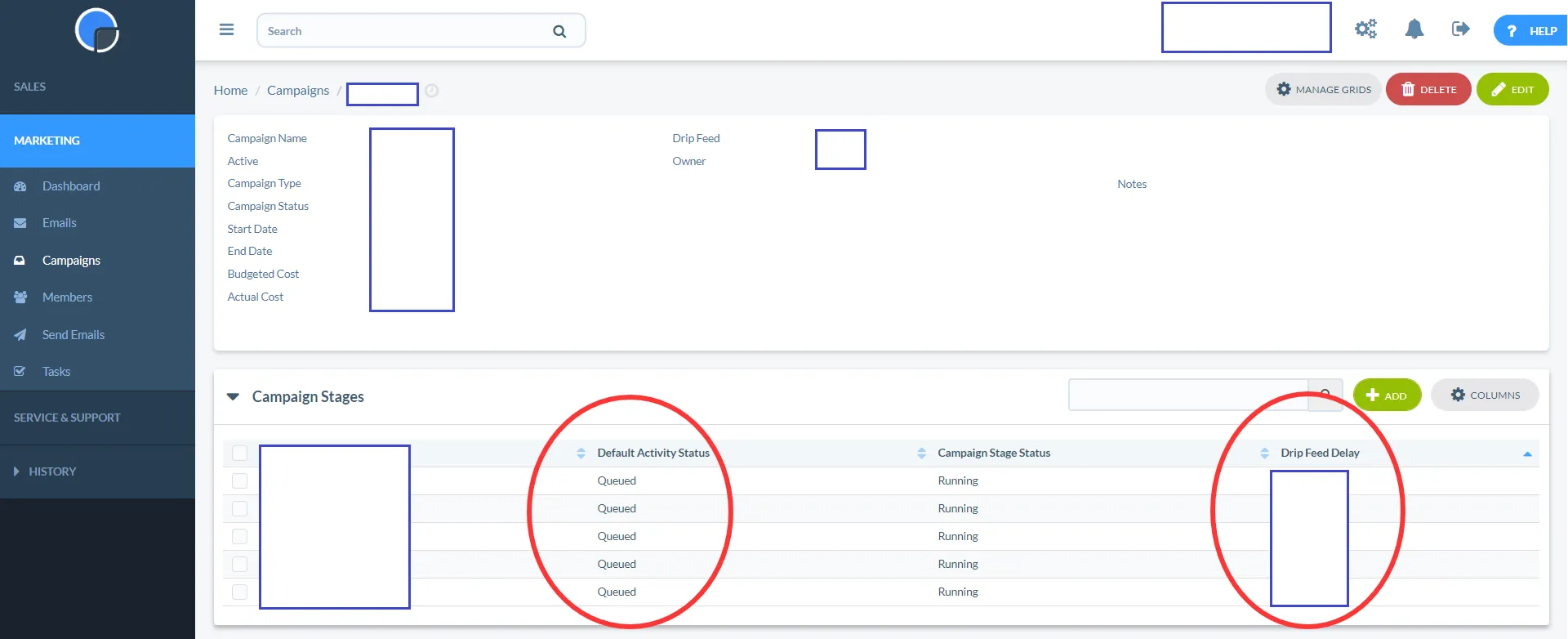
Drip’s user-friendly interface and robust feature set make it accessible and beneficial for businesses of all sizes. Whether you’re a small startup looking to streamline your marketing efforts or a large enterprise aiming to enhance customer engagement, Drip provides the tools and capabilities needed to achieve your goals. The platform’s emphasis on data-driven marketing and automation allows Shopify store owners to deliver personalized experiences, boost customer loyalty, and drive revenue growth.
Key Features
- Personalization: Drip’s personalization features allow businesses to tailor their communications based on individual customer data. This includes personalized email content, product recommendations, and dynamic content that adapts to the recipient’s behavior and preferences.
- Integration with Shopify: Drip integrates seamlessly with Shopify, syncing customer data, purchase history, and website activity. This integration ensures that all customer interactions are tracked and recorded, providing a complete view of the customer journey.
- Advanced Analytics and Reporting: Drip offers robust analytics and reporting tools that provide insights into campaign performance, customer behavior, and sales trends. Customizable dashboards and reports make it easy to monitor key metrics and make data-driven decisions.
- eCommerce CRM: Drip is specifically designed for eCommerce, with features that cater to the unique needs of online retailers. This includes abandoned cart recovery, product recommendations, and personalized email marketing based on customer behavior.
- Lead Scoring and Tracking: Drip includes lead scoring and tracking features that help businesses identify high-value prospects and prioritize their efforts accordingly. This ensures that sales teams can focus on leads that are most likely to convert.
- Forms and Pop-ups: Drip allows businesses to create customizable forms and pop-ups to capture leads and grow their email lists. These forms can be embedded on websites or shared through social media and email campaigns.
Pros and Cons
Pros
- Simplicity and Power: Drip is one of the quickest platforms to use in terms of setting up simple drip email sequences. Yet it also packs enormous power if you need to do complex automation.
- Direct Integrations: Drip’s direct integrations with other systems mean you can easily create hyper-personalized communications, and setup is straightforward.
- JavaScript Embed: Drip’s JavaScript embed is easy to set up and helps build deeper insights into customer behavior as well as triggering automation.
- Advanced Workflows and Triggers: The platform allows users to create advanced workflows and triggers, customizable to an infinite level of sophistication.
- Robust Analytics: Drip offers powerful analytics, enabling users to create custom segment analyses by data tags and defined fields.
Cons
- Complex Email Scheduling: The process for sending emails at specific dates and times can be complicated.
- Visual Builder: The existing visual builder is functional but could be more intuitive.
- Limited CRM Functions: While Drip excels in marketing automation, its CRM capabilities are somewhat lacking compared to other CRM platforms.
- Reporting: The reporting features are not always the best and could be improved for better usability and insights.
Additional information and Overall evaluation
Deployment | Cloud-based; On-premise |
Platforms | Linux - MacOS - Windows |
Mobile app | Android, iOS |
Price | Pro: $59/user/month Pro+: $89/user/month Enterprise: $159/user/month |
Free Trial | 14 days |
Shopify Integration | Yes |
Suitable for | All-sized eCommerce business |
Drip is an outstanding choice for Shopify store owners seeking a powerful and specialized CRM solution focused on marketing automation and customer relationship management. Its seamless integration with Shopify, advanced analytics, and robust personalization features make it one of the best CRMs for managing customer relationships and driving sales growth. Particularly well-suited for businesses aiming to enhance customer engagement and deliver personalized experiences, Drip excels at creating targeted marketing campaigns based on customer behavior and preferences.
Drip is suitable for businesses of all sizes, from small startups to large enterprises, thanks to its simplicity and powerful capabilities. It is quick to set up for basic drip email sequences and also offers complex automation for more sophisticated marketing needs. Direct integrations with other systems allow for hyper-personalized communications, and the easy-to-use JavaScript embed helps build deeper insights into customer behavior.
While there are some considerations regarding the complexity of scheduling emails, the intuitiveness of the visual builder, and the CRM functions being less robust compared to other platforms, these drawbacks are minor compared to the overall benefits. Drip’s powerful analytics and ability to create advanced workflows and triggers provide significant value.
For Shopify store owners aiming to take their marketing to the next level, Drip offers the tools and capabilities needed to deliver personalized experiences, recover lost sales, and achieve long-term success in the competitive world of eCommerce. By choosing Drip as their CRM solution, Shopify store owners can ensure they are well-equipped to meet the demands of their customers, enhance their marketing efforts, and drive sales growth, positioning themselves for success in the dynamic eCommerce landscape.
Streak
Streak is a unique and highly effective CRM solution that integrates directly with Gmail, making it one of the best CRMs for Shopify stores. Designed to operate seamlessly within the Google Workspace environment, Streak allows Shopify store owners to manage their customer relationships and sales processes without ever leaving their inbox. This integration simplified workflow, enhances productivity, and provides a familiar interface that users find easy to navigate.

Streak is particularly beneficial for small to medium-sized businesses looking to streamline their operations and improve customer engagement through email communication. The platform’s user-friendly design, combined with its powerful features, ensures that businesses can track sales pipelines, manage leads, and automate repetitive tasks efficiently. By leveraging the capabilities of Gmail, Streak offers a convenient and efficient CRM solution that is both affordable and effective.
Key features
- Gmail Integration: Streak operates directly within Gmail, allowing users to manage their CRM activities without leaving their email inbox. This integration ensures that all customer interactions are tracked and recorded within a familiar interface.
- Sales Pipeline Management: Streak provides a visual sales pipeline that helps users track and manage their sales opportunities from start to finish. The customizable pipeline stages allow businesses to tailor the sales process to their specific needs.
- Email Tracking: The platform includes email tracking capabilities, notifying users when emails are opened and read. This feature helps sales teams prioritize follow-ups and engage with prospects more effectively.
- Task Management: Streak allows users to create and manage tasks directly within Gmail. Task reminders and notifications ensure that important activities are not missed, enhancing productivity.
- Mail Merge: Streak’s mail merge feature enables users to send personalized bulk emails directly from Gmail. This is particularly useful for marketing campaigns and customer outreach efforts.
- Collaboration Tools: Streak offers collaboration tools that allow team members to share emails, notes, and call logs. This ensures that everyone is on the same page and that customer interactions are coordinated effectively.
- Contact Management: Users can store and manage contact information within Streak, linking emails and tasks to specific contacts. This feature provides a comprehensive view of each customer’s interactions and history.
- Customizable Workflows: Streak allows businesses to create and customize workflows to match their specific processes. This flexibility ensures that the CRM can adapt to the unique needs of each business.
- Integration with Google Workspace: Streak integrates seamlessly with other Google Workspace applications, such as Google Calendar and Google Drive. This integration enhances productivity and ensures that all tools work together smoothly.
Pros and Cons
Pros
- Seamless Gmail Integration: Streak operates directly within Gmail, providing a familiar and convenient interface for managing CRM activities.
- User-Friendly: The platform is easy to use, making it accessible for users with varying levels of technical expertise.
- Sales Pipeline Management: Streak’s visual sales pipeline helps businesses track and manage sales opportunities effectively.
- Email Tracking: The email tracking feature provides valuable insights into customer engagement, helping sales teams prioritize follow-ups.
- Customizable Workflows: Streak’s customizable workflows allow businesses to tailor the CRM to their specific needs.
Cons
- Limited Advanced CRM Features: While Streak excels in email-based CRM activities, it may lack some advanced features found in more comprehensive CRM platforms.
- Dependence on Gmail: Streak’s functionality is tied to Gmail, which may be a limitation for businesses using other email platforms.
- Complexity in Large Teams: Managing large teams and complex sales processes may be challenging due to the platform’s simplicity and email-centric design.
Additional information and Overall evaluation
Deployment | Cloud-based; On-premise |
Platforms | Linux - MacOS - Windows |
Mobile app | Android, iOS |
Price | Pro: $59/user/month Pro+: $89/user/month Enterprise: $159/user/month |
Free Trial | 14 days |
Shopify Integration | Yes |
Suitable for | All-sized eCommerce business |
Streak is an excellent choice for Shopify store owners seeking a CRM solution that integrates seamlessly with Gmail. Its user-friendly design, combined with powerful email tracking, sales pipeline management, and customizable workflows, makes it one of the best CRMs for managing customer relationships and driving sales growth. Suitable for small to medium-sized businesses, Streak provides the tools and capabilities needed to streamline operations and enhance customer engagement through email communication.
While there are some considerations regarding advanced CRM features and integration limitations, the benefits of improved productivity, enhanced customer insights, and streamlined workflows far outweigh these potential drawbacks. For Shopify store owners aiming to take their email-based sales and customer management to the next level, Streak provides a convenient and effective solution.
By choosing Streak as their CRM solution, Shopify store owners can ensure they are well-equipped to meet the demands of their customers, enhance their email marketing efforts, and drive sales growth, positioning themselves for success in the dynamic eCommerce landscape.
Nimble
Nimble is a powerful and intuitive CRM solution designed to help businesses build and maintain strong customer relationships. Recognized as one of the best CRMs for Shopify stores, Nimble integrates seamlessly with various platforms, including Shopify, to provide a comprehensive view of customer interactions and streamline business processes. Its emphasis on simplicity and usability makes it an ideal choice for small to medium-sized businesses looking to enhance their customer relationship management efforts.
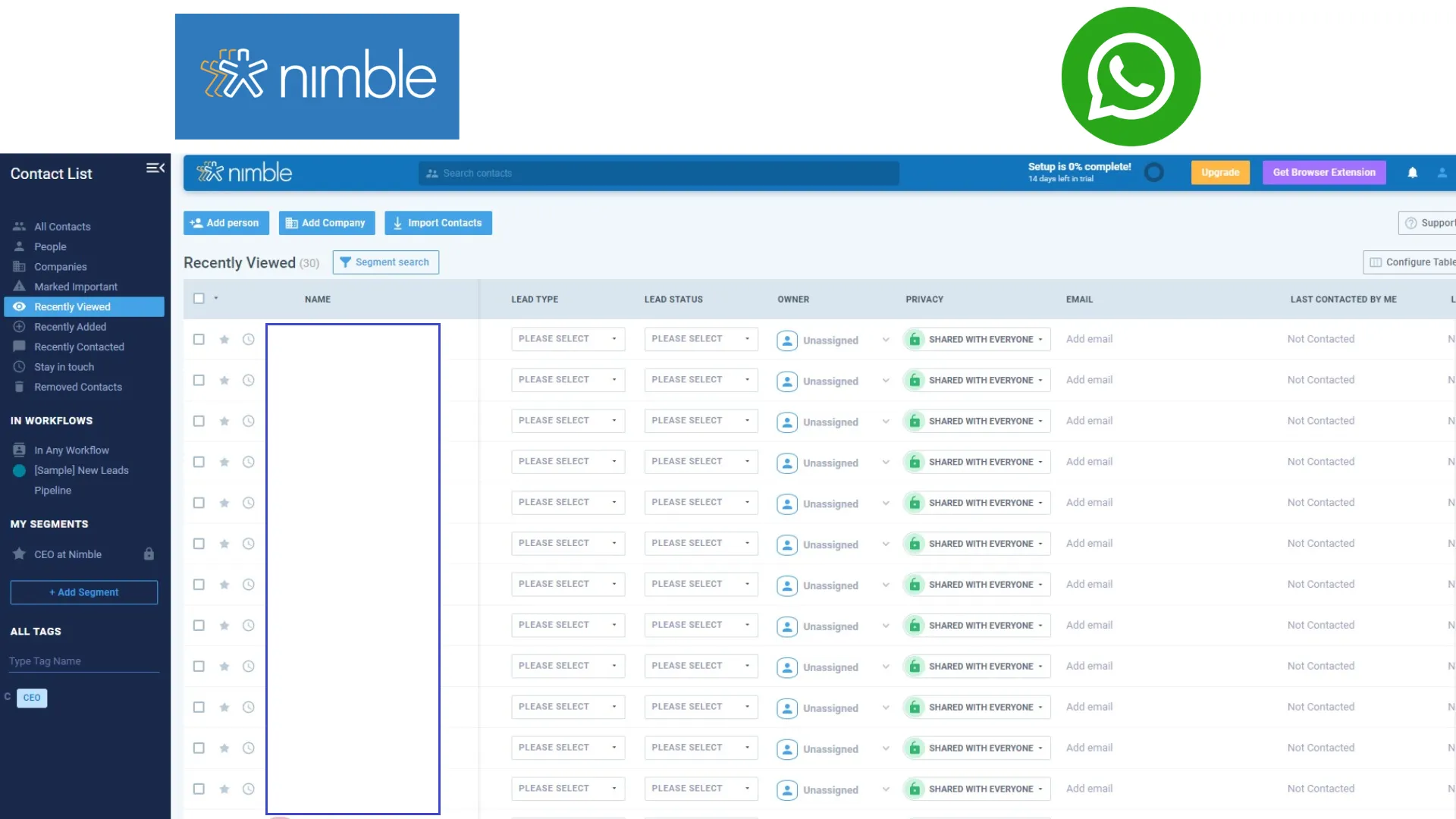
Nimble’s standout feature is its ability to consolidate customer information from multiple sources into a single, unified view. This integration ensures that Shopify store owners have access to all relevant customer data, enabling them to deliver personalized experiences and improve customer satisfaction. Additionally, Nimble’s robust automation and analytics capabilities help businesses track performance, identify opportunities, and make data-driven decisions to drive growth.
Key features
- Smart Social Search: This feature automates the process of collecting contact information and details from social media pages, providing helpful business insights and enabling businesses to engage more effectively with their audience.
- Today Page: Nimble’s Today Page provides organization by listing and arranging priority clients, reminders, and updates on an intuitive board. This helps users stay on top of important tasks and client interactions.
- Single Engagement Platform: Nimble allows businesses to engage on multiple sites through one platform. It syncs and integrates data and activity from commonly used apps such as Gmail, Pipedrive, social media channels, Mailchimp, and many others.
- Sales Intelligence: This feature simplifies the process of reaching out to prospects by sorting them by company size, industry, location, revenue, and other key details. This ensures that sales and marketing efforts target the right types of businesses.
- Prospect Building: Nimble provides insights into customer relationships by quickly scanning the sales funnel, calendar, social signals, and tasks at hand. This helps businesses understand where they stand with each prospect and what actions are needed.
- Emailing and Tracking: Nimble provides insight into customer activity by keeping track of opened emails and clicks. It shows the number of times a prospect has opened a particular message, directly from Gmail, helping businesses gauge interest and plan follow-ups.
- Auto Sync: This feature removes data entry tasks by automatically syncing data and insights. This helps businesses engage customers more effectively by having up-to-date information readily available.
- Contact Discoveries: Using the Enrichment Credits feature in the Nimble Prospector App, Nimble filters out old data and updates contacts with the latest information. This ensures that businesses have accurate and current contact details.
- Sales Forecasts and Analytics: Nimble’s deal forecasting and pipeline analytics can predict the team’s historical and predictive revenue in greater detail. This helps identify which deals need attention and allows for better planning and strategy.
- App Integrations: Nimble makes it easy to work anytime, anywhere with over 100 integrated apps along with additional add-ons that facilitate business collaboration. This ensures that businesses can integrate Nimble with the tools they already use.
Pros and Cons
Pros
- Tracking: Nimble offers seamless tracking of tasks and spreadsheets, making it easy to keep tabs on all business activities and ensuring nothing falls through the cracks.
- Easy to Use: The platform’s interface and features are user-friendly, allowing users to quickly adapt and efficiently manage their CRM activities.
- Automation: Nimble helps automate many tasks, reducing the need for manual entries and saving time for more strategic activities.
Cons
- Integrations: While Nimble integrates with many apps, the integrations can be basic, and additional third-party apps may be needed for more advanced integration needs.
- Mobile Application: The mobile app is slower compared to the desktop version, which can affect productivity when working on the go.
- No Auto-Sync: The system requires third-party apps to enable the auto-sync function, which could add complexity and extra steps for users.
Additional information and Overall evaluation
Deployment | Cloud-based |
Platforms | Linux - MacOS - Windows - ChromeOS - Android |
Mobile app | Android, iOS |
Price | Basic: $15/user/month Standard: $20/user/month Pro: $33/user/month Enterprise: Contact Sales |
Free Trial | 14 days |
Shopify Integration | Yes |
Suitable for | All-sized eCommerce Business |
Nimble is an excellent choice for Shopify store owners seeking a powerful and user-friendly CRM solution focused on contact management and social media integration. Its seamless integration with Shopify, advanced analytics, and robust email marketing features make it one of the best CRMs for managing customer relationships and driving sales growth. Suitable for businesses of all sizes, Nimble provides the tools and capabilities needed to streamline operations and enhance customer engagement.
Nimble’s ability to consolidate customer information from multiple sources into a single, unified view allows Shopify store owners to deliver personalized experiences and improve customer satisfaction. The platform’s automation features help reduce manual tasks, while its advanced analytics offer valuable insights into customer behavior and sales performance. While there are some considerations regarding advanced CRM features, customization limitations, and pricing, the benefits of improved customer insights, enhanced social media engagement, and streamlined workflows far outweigh these potential drawbacks.
For Shopify store owners aiming to take their customer relationship management to the next level, Nimble provides a convenient and effective solution. By choosing Nimble as their CRM solution, Shopify store owners can ensure they are well-equipped to meet the demands of their customers, enhance their marketing efforts, and drive sales growth, positioning themselves for success in the dynamic eCommerce landscape.
Monday.com
Monday.com is recognized as one of the best CRMs for Shopify stores due to its highly customizable platform and comprehensive project management capabilities. Designed to cater to businesses of all sizes, Monday.com integrates seamlessly with Shopify, providing a unified platform for managing customer relationships, sales pipelines, and marketing campaigns. Its user-friendly interface and robust feature set make it an ideal choice for Shopify store owners looking to streamline their operations and enhance customer engagement.
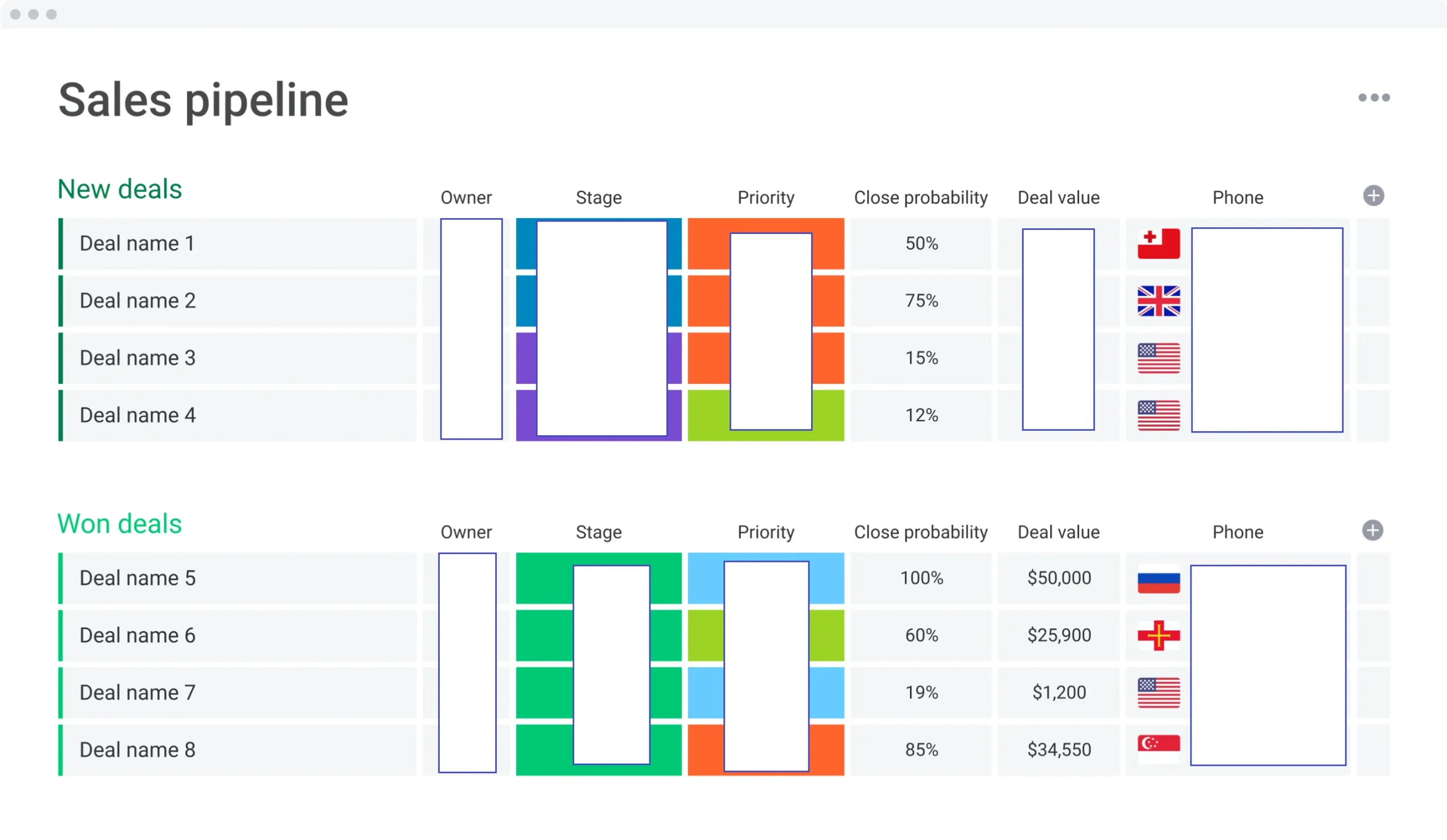
What sets Monday.com apart as the best CRM for Shopify stores is its flexibility and adaptability. The platform allows businesses to create custom workflows and processes tailored to their unique needs, ensuring that all aspects of customer relationship management are covered. Additionally, Monday.com’s extensive automation and integration capabilities help businesses save time, reduce manual tasks, and make data-driven decisions.
Key features
- Sales Pipeline Management: Monday.com enables users to forecast revenue and build strategic plans. It allows the addition of a formula column to calculate commissions earned by sales representatives. Users can mirror point of contact, phone number, and email address columns from the CRM board to the sales board for seamless data synchronization.
- Lead Generation: The platform categorizes leads into three groups – incoming, qualified, and unqualified. Leads can be automatically assigned to sales representatives, enhancing workflow efficiency and ensuring timely follow-ups.
- Activity Tracking: Monday.com maintains comprehensive board, item, and subitem activity logs to keep users updated on job progress. This feature helps ensure that all tasks are monitored and tracked effectively.
- Marketing and Creative Management: The platform supports the development of marketing strategies and creation of creative briefs aimed at reaching a broader audience. Users can organize content by priority, channel, publish date, and type using the content calendar. Digital assets can be stored in an easily accessible location, and teams are automatically notified about top-performing keywords, approvals, and campaign deadlines.
Pros and Cons
Pros
- Project Management: Monday.com excels in task management, project planning, and goal tracking capabilities, helping teams complete jobs on schedule and stay organized.
- Ease of Use: The platform offers an intuitive user interface, making it easy for users to navigate and utilize its powerful features.
- Sharing and Collaboration: Monday.com provides a centralized database, comments, and tagging features that help teams communicate effectively and keep all information in one place.
- Customization: The platform allows users to customize board columns to fit their company’s needs. Users can access information such as project statuses, assignees, due dates, locations, notes, links, and numbers.
Cons
- Performance: Some features can be clunky, affecting the overall user experience and efficiency.
- Limited Functionalities: The product does not offer robust communication tools and unlimited customization options, which may limit its flexibility for some users.
- Steep Learning Curve: While the interface is user-friendly, the platform has a steep learning curve, especially when setting up and customizing workflows.
- Implementation Processes: The implementation process can be time-consuming, requiring significant effort to fully set up and optimize the platform for business needs.
Additional information and Overall evaluation
Deployment | Cloud-based |
Platforms | Linux - MacOS - Windows - ChromeOS - Android |
Mobile app | Android, iOS |
Price | Basic: $15/user/month Standard: $20/user/month Pro: $33/user/month Enterprise: Contact Sales |
Free Trial | 14 days |
Shopify Integration | Yes |
Suitable for | All-sized eCommerce Business |
All in all, Monday.com is an excellent choice for Shopify store owners seeking a powerful and highly customizable CRM solution that also offers robust project management capabilities. Its seamless integration with Shopify, advanced analytics, and comprehensive sales pipeline management features make it one of the best CRMs for managing customer relationships and driving sales growth. Suitable for businesses of all sizes, Monday.com provides the tools and capabilities needed to streamline operations, enhance customer engagement, and improve overall business management.
The platform’s flexibility allows businesses to create workflows and processes tailored to their specific needs, making it a versatile tool for various industries. While there are some considerations regarding performance, limited functionalities, a steep learning curve, and time-consuming implementation processes, the benefits of improved productivity, enhanced customer insights, and streamlined workflows far outweigh these potential drawbacks.
For Shopify store owners aiming to take their business operations to the next level, Monday.com offers a versatile and effective solution. By choosing Monday.com as their CRM solution, Shopify store owners can ensure they are well-equipped to meet the demands of their customers, enhance their sales and marketing efforts, and drive sales growth, positioning themselves for success in the dynamic eCommerce landscape.
Copper
Copper is widely recognized as one of the best CRMs for Shopify stores due to its seamless integration with Google Workspace, user-friendly interface, and robust feature set. Designed to cater to businesses of all sizes, Copper provides an intuitive platform that helps Shopify store owners manage their customer relationships, sales pipelines, and marketing campaigns efficiently. The platform’s deep integration with Google apps ensures that businesses can streamline their workflows and enhance productivity without needing to switch between multiple tools.
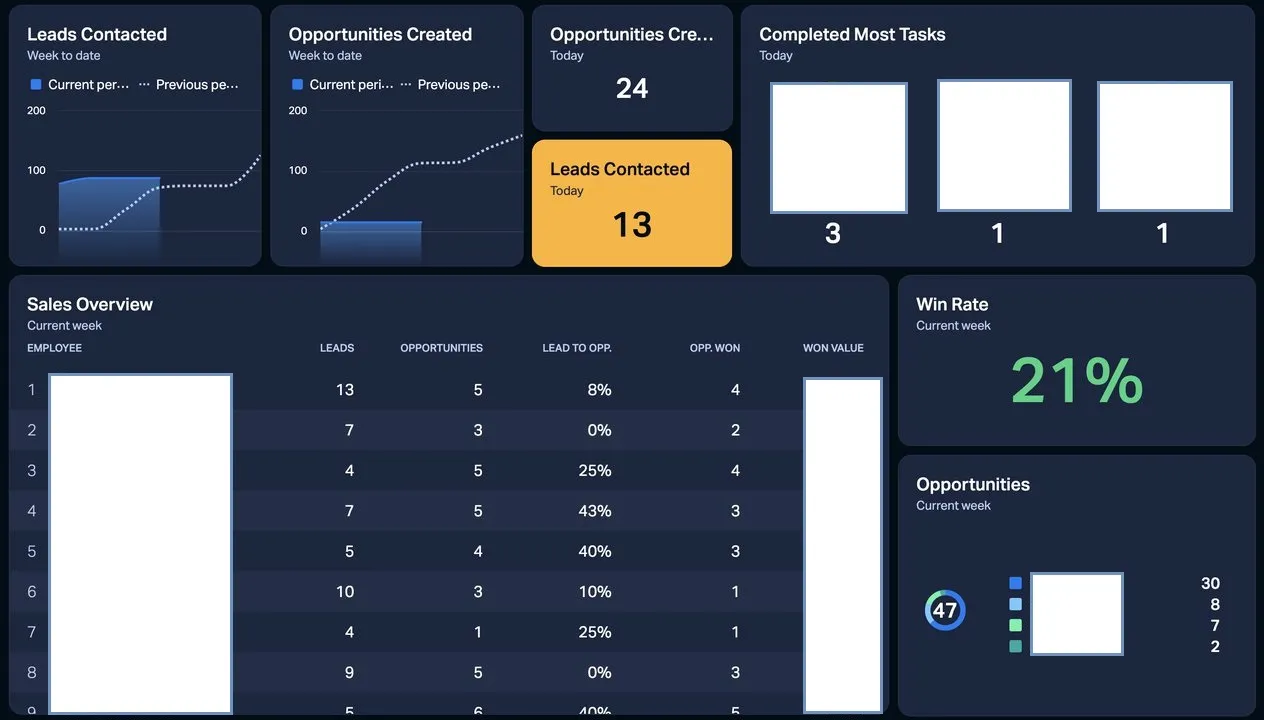
What sets Copper apart as the best CRM for Shopify stores is its ease of use and powerful automation capabilities. The platform is designed to work seamlessly with Gmail, Google Calendar, and other Google Workspace tools, making it incredibly easy for users to manage their CRM activities directly from their inbox. This integration not only saves time but also ensures that all customer interactions are tracked and recorded in real-time. Copper’s automation features help reduce manual tasks, allowing businesses to focus on building strong customer relationships and driving sales growth.
Key features
- Google Workspace Integration: Copper integrates seamlessly with Google Workspace, allowing users to manage their CRM activities directly from Gmail, Google Calendar, and other Google apps. This integration ensures that all customer interactions are tracked and recorded automatically, providing a complete view of the customer journey.
- Sales Pipeline Management: Copper provides a visual sales pipeline that helps users track and manage their sales opportunities from start to finish. The customizable pipeline stages and drag-and-drop interface make it easy to monitor progress and prioritize high-value deals.
- Contact Management: Copper consolidates contact information from various sources, providing a unified view of each customer. This feature helps businesses manage all customer interactions in one place, improving efficiency and customer engagement.
- Task and Activity Management: Copper helps users stay organized with task and activity management tools. Users can schedule tasks, set reminders, and track activities to ensure that important actions are completed on time.
- Lead Management: The platform offers comprehensive lead management tools, including lead scoring, segmentation, and tracking. These features help sales teams focus on the most promising leads and convert them into customers.
- Reporting and Analytics: Copper provides robust analytics and reporting tools that offer insights into sales performance, customer behavior, and team productivity. Customizable dashboards and reports make it easy to monitor key metrics and make data-driven decisions.
- Automation and Workflow Management: Copper includes powerful automation tools that help streamline repetitive tasks and ensure that important activities are completed on time. Automation capabilities include sending notifications, updating records, and managing workflows based on predefined triggers.
Pros and Cons
Pros
- G Suite and Gmail Integration: Copper simplifies managing data and accessing contact information by integrating seamlessly with G Suite and Gmail. This makes it easy to manage CRM activities directly from the tools users are already familiar with.
- Easy to Use: The interface is intuitive and easy to navigate, making it straightforward for users to get started. Setup is also simple, minimizing the time needed to begin using the platform effectively.
- Tracking Client Interaction: Copper makes it easy to track conversions and interactions with clients, helping businesses stay organized and maintain detailed records of customer engagement.
- Customization: The platform allows for customization of various aspects, enabling businesses to tailor Copper to their specific needs and workflows.
Cons
- Technical Glitches: Users occasionally experience technical issues, such as not being able to change font colors when adding notes or having to log in repetitively due to connection errors.
- Reports: There is a lack of daily accurate reports on progress, which can limit the ability to track ongoing performance effectively.
- Email Tracking: This feature needs improvement, as it’s currently not possible to send emails with graphics or merge those emails, limiting the effectiveness of email campaigns.
Additional information and Overall evaluation
Deployment | Cloud-based, On Premise |
Platforms | Linux - MacOS - Windows - ChromeOS - Android |
Mobile app | Android, iOS |
Price | Starter: $12/user/month Basic: $29/user/month Professional: $69/user/month Business: $134/user/month |
Free Trial | 14 days |
Shopify Integration | Yes |
Suitable for | Small and medium-sized eCommerce businesses |
In conclusion, Copper is an excellent choice for Shopify store owners seeking a powerful and user-friendly CRM solution that integrates seamlessly with Google Workspace. Its advanced analytics, robust sales pipeline management, and comprehensive contact management features make it one of the best CRMs for managing customer relationships and driving sales growth. Particularly suitable for small and medium-sized enterprises (SMEs), Copper provides the tools and capabilities needed to streamline operations, enhance customer engagement, and improve overall business management.
Copper’s integration with G Suite and Gmail simplifies data management and access to contact information, making it a highly convenient option for users already familiar with these tools. The platform’s ease of use and customization options further enhance its appeal, allowing businesses to tailor the CRM to their specific needs. However, there are some considerations regarding technical glitches, limited reporting capabilities, and the need for improvements in email tracking.
Despite these drawbacks, the benefits of improved productivity, enhanced customer insights, and streamlined workflows far outweigh the potential challenges. For Shopify store owners aiming to take their business operations to the next level, Copper offers a versatile and effective solution.
By choosing Copper as their CRM solution, Shopify store owners can ensure they are well-equipped to meet the demands of their customers, enhance their sales and marketing efforts, and drive sales growth, positioning themselves for success in the dynamic eCommerce landscape.
Benefits of integrating CRM system for Shopify stores
- Building a pipeline: Understand the projects you’ve completed, the ones you’re working on now, and the ones you have coming up. By knowing how the finance is performing, you can decide if hunting for new clients that specific month is necessary.
- Using your time wisely: Even if you currently have a time management program in place, a CRM is still far superior. A CRM can display a broad overview of the projects you and your coworkers are currently working on, the total number of design hours invested in a project thus far, etc.
- Knowing your customers: With the use of a CRM, you can access a consistent stream of customer data and timelines. And you can tailor your marketing strategies to these customers’ micro-moments, psychographics, and demographics.
- Enhancing interactions with clients: When business is booming, some clients may occasionally get put on the back burner because of the size of their project, their budget, or their deadline. CRMs can help with this.
- Expanding accountability: A wonderful method to keep accountable to yourself, your job, and your clients is to have all of your clients in one location. It will show defined deadlines and milestones.
- Improving internal communication: A CRM provides your team with the insightful data they need to communicate both with clients and between themselves. This setting makes it possible for anyone working for your company to quickly take over a client connection.
- Establishing a paper trail: Upload all of your contracts and other relevant documents into your CRM. This way, everything is easily accessible and in one central location whenever you need it.
Essential Functions of the Best CRM for Shopify Stores
Selecting the best CRM for your Shopify store is crucial for enhancing customer relationship management and driving business growth. An ideal CRM should not only integrate seamlessly with Shopify but also offer robust features that streamline operations, improve customer engagement, and provide valuable insights. Here are the key capabilities; along with other additional functions that the best CRM for Shopify stores should deliver to ensure optimal performance and success.
Choosing a Shopify CRM: What core function to consider?
Selecting the best CRM for your Shopify store involves evaluating several critical features to ensure the solution aligns with your business needs. Here are key factors to consider when choosing a Shopify CRM:
Comprehensive customer profiles
A good CRM should provide detailed customer profiles that aggregate information from various touchpoints. This includes purchase history, interaction history, preferences, and personal details. By compiling all this information into comprehensive profiles, businesses gain a holistic view of each customer. This in-depth understanding allows for more personalized marketing efforts, tailored recommendations, and targeted promotions, which can significantly enhance customer satisfaction and loyalty.
Comprehensive customer profiles also enable businesses to anticipate customer needs and behavior. By analyzing past interactions and purchasing patterns, companies can predict future behavior and create proactive marketing strategies. This level of personalization not only improves the customer experience but also increases the likelihood of repeat purchases, thereby boosting overall sales and revenue.
The ability to tag consumers with both preset and custom tags
The ability to tag consumers with both preset and custom tags is essential for effective organization and segmentation within a CRM. Tags help categorize customers based on behavior, preferences, purchase history, and other relevant criteria. This functionality is crucial for creating targeted marketing campaigns and personalized communication strategies that resonate with different customer segments.
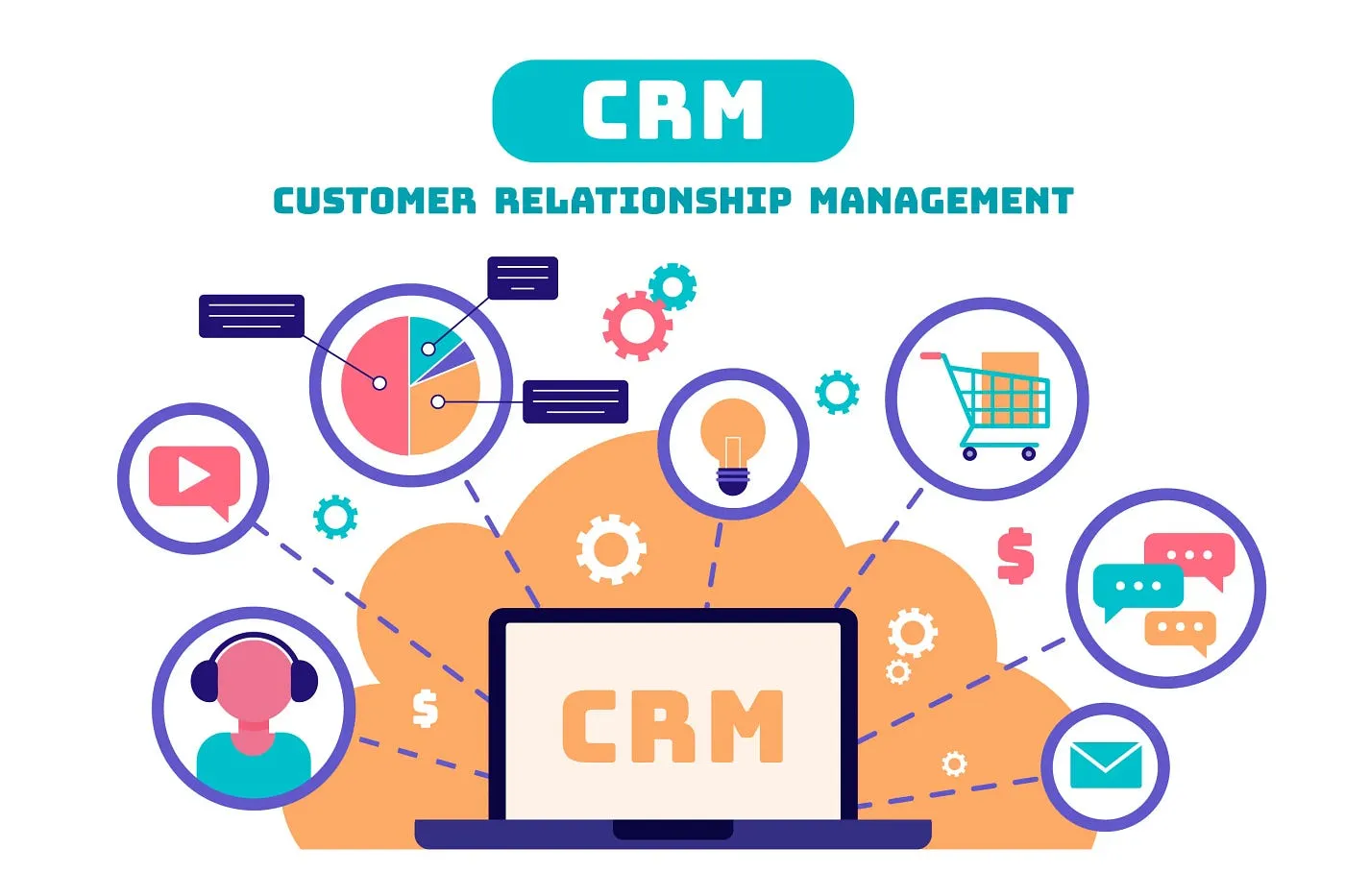
Tagging capabilities also enhance internal efficiency by enabling quick identification and retrieval of specific customer groups. For instance, during promotional campaigns or product launches, businesses can easily filter customers based on tags such as high spenders, loyal customers, or recent buyers. This targeted approach ensures that marketing efforts are directed towards the most relevant audience, maximizing engagement and conversion rates.
Segmentation
Segmentation is a crucial feature that allows businesses to divide their customer base into specific groups based on various criteria such as demographics, purchase behavior, and engagement levels. Effective segmentation enables targeted marketing campaigns, ensuring that the right message reaches the right audience at the right time. This targeted approach not only improves marketing effectiveness but also enhances customer satisfaction by providing relevant and personalized content.
Furthermore, segmentation helps businesses identify and focus on high-value customer segments. By analyzing different segments, companies can allocate resources more efficiently and develop strategies tailored to the needs of each group. This strategic approach leads to better customer retention, increased sales, and higher lifetime value for each customer.
Additional client metrics
Beyond basic contact information and purchase history, a robust CRM should provide additional client metrics. These might include lifetime value, average order value, and engagement rates. Such metrics are invaluable for understanding the overall health of customer relationships and identifying opportunities for growth. By tracking these metrics, businesses can gauge the effectiveness of their marketing efforts and make data-driven decisions to enhance customer engagement and drive sales.
Additional client metrics also help businesses identify potential issues before they escalate. For example, a declining engagement rate might indicate dissatisfaction, prompting proactive measures to address customer concerns. By leveraging these insights, companies can improve their customer retention strategies and build stronger, more loyal customer relationships.
Direct communication with people from the platform
A key feature of any CRM is the ability to communicate directly with customers from the platform. This includes sending emails, SMS, or even managing social media interactions. Direct communication capabilities streamline the process of engaging with customers and ensure that all interactions are logged and tracked within the CRM. This centralized approach allows for consistent and timely communication, improving customer satisfaction and loyalty.
Direct communication also enables businesses to respond quickly to customer inquiries and concerns. By having all communication tools integrated into the CRM, companies can provide seamless support and build stronger relationships with their customers. This responsiveness not only enhances the customer experience but also boosts the brand’s reputation for reliability and customer care.
Smooth integration
Smooth integration with your Shopify store is non-negotiable. The CRM should seamlessly sync customer data, order information, and other relevant metrics with your Shopify platform. This integration ensures that all customer interactions are tracked and recorded, providing a unified view of the customer journey. Additionally, the CRM should integrate well with other tools you use, such as email marketing software, social media management tools, and analytics platforms.
A well-integrated CRM enhances operational efficiency by reducing the need for manual data entry and ensuring data consistency across platforms. It also enables businesses to leverage their existing tools and systems, creating a cohesive and streamlined workflow. This unified approach allows for better data analysis, more informed decision-making, and ultimately, a more effective and personalized customer engagement strategy.
What additional function can your CRM for Shopify stores help you with?
An effective CRM for Shopify stores goes beyond basic customer relationship management to offer additional functionalities that can significantly enhance your business operations. Here are some key areas where a robust CRM can provide added value:
Email Campaigns
A top-tier CRM enables you to create, send, and track email campaigns directly from the platform. By leveraging customer data, you can craft personalized email content that resonates with your audience, improving open and click-through rates. Automated email sequences can nurture leads, recover abandoned carts, and promote new products, all while tracking engagement metrics to refine your strategies.
You can set up strong email automation that is driven by the actions users perform on your site using customer behavior data. Simply by incorporating consumer behavior into your email automation campaigns, you might be converting customers on autopilot.
You could send people suitable newsletters by using segmentation and tagging as well. With the majority of Shopify CRMs, you will need to export that segment and import it into your email tool if you want to send a specific message or offer to a group of people. It would be ideal if they were all connected.
Retention
Customer retention is crucial for long-term success, and a powerful CRM helps you achieve this by providing tools to understand and engage your existing customers better. Features like loyalty programs, personalized offers, and targeted follow-up emails can enhance customer satisfaction and encourage repeat purchases. Detailed analytics help you identify at-risk customers and proactively address their needs to reduce churn.
Retention is the secret to eCommerce success since one cannot simply continuously be in the acquisition phase. It’s costly, and your profit margins will vanish. Instead, you can use customer behavior data to persuade customers who haven’t made a purchase in a while, or you can nurture them with content until they’re ready to do so.
Additionally, tagging them makes it easier to keep track of everything and personalize the experience you offer. As your business expands, you’ll find it helpful to keep track of consumer traits and preferences so you can locate them quickly in the future and take appropriate action.
Build a community
Building a strong community around your brand fosters loyalty and creates advocates for your business. A CRM can help facilitate community-building efforts by integrating with social media platforms, enabling you to engage with customers, share content, and respond to feedback. Additionally, the CRM can manage and track interactions within customer forums, discussion groups, and events, helping you nurture a sense of belonging and connection among your customers.
You have a deeper understanding of the people who are driving those clicks and purchases thanks to all of this consumer data. In addition, you’ll be able to develop much deeper bonds with your clients and supporters.
In conclusion,
As we have explored, various CRMs such as Zendesk Sell, HubSpot CRM, Mailchimp, Agile CRM, Salesforce CRM, Odoo, ActiveCampaign, Streak, Nimble, Monday.com, and Copper each offer unique features and benefits that can cater to different business needs. Whether you are a small to medium-sized enterprise or a larger business, finding a CRM that aligns with your specific requirements can significantly impact your efficiency and success.
Moreover, the best CRM for Shopify stores should enhance your capabilities beyond basic CRM functions. It should support effective email campaigns, improve customer retention, and help build a strong community around your brand. By leveraging these additional functionalities, you can create more personalized and engaging customer experiences, fostering loyalty and advocacy.
Ultimately, the best CRM for Shopify stores will empower you to streamline your operations, make data-driven decisions, and build lasting relationships with your customers. By carefully considering the features and capabilities that are most important to your business, you can choose a CRM that not only meets your current needs but also scales with your growth, positioning you for long-term success in the dynamic eCommerce landscape.



